

How To Write An EPQ Essay & Dissertation (9 Steps)
Writing an EPQ essay involves several steps to ensure a well-structured and compelling piece.
Here is a 9-step guide to help you write an effective EPQ essay:
- Brainstorm EPQ topic ideas : Choose an engaging topic that interests you and is relevant to your academic or career goals.
- Conduct research : Gather information from various sources to support your arguments and provide evidence.
- Create a structure : Organise your essay with a clear introduction, main body, and conclusion. Outline the main points and arguments you will cover in each section.
- Write an introduction : Begin your essay with an introductory paragraph that introduces the topic, outlines the scope of the essay, and provides an overview of the structure 4 .
- Develop the main body : Write the main body of the essay, focusing on presenting your arguments, evidence, and analysis. Ensure each paragraph has a clear topic sentence and flows logically from one point to the next.
- Use proper referencing : Cite your sources correctly to avoid plagiarism and demonstrate your research skills.
- Write a conclusion : Summarise your main points and answer the question you posed at the beginning of the essay.
- Review and revise : Proofread your essay for grammar, spelling, and punctuation errors. Ensure your arguments are clear, coherent, and well-supported 1 .
- Seek feedback : Ask a teacher, tutor, or peer to review your essay and provide constructive feedback to help you improve your work
The article below is designed to help you develop a strong foundation for writing your EPQ essay by providing practical tips and guidance from an expert in the field.
You’ll learn about key elements such as structure, formatting, research methods, argumentation techniques and more so that you can craft a compelling paper that stands out from the crowd.
By following these steps, you’ll have all the tools necessary to make sure your EPQ essay stands out and meets its desired goals.
- 1 Understanding The EPQ Essay Requirements
- 2.1 Organizing Ideas
- 2.2 Outlining Content
- 3 Formatting Your Essay
- 4 Researching For Your Essay
- 5 Developing Your Argument
- 6 Crafting A Compelling Conclusion
- 7 Writing a good EPQ essay
Understanding The EPQ Essay Requirements
Navigating the world of EPQ essay writing can be intimidating, and even overwhelming at times! But never fear – with a little bit of knowledge and preparation you’ll find yourself soaring towards success.
At its core, crafting an effective EPQ essay comes down to analyzing expectations and exploring options. It’s important to take into account the specific requirements for your topic or course; many professors will have different standards that need to be met.
Once you’re clear on what needs to be accomplished, it’s time to get creative – start brainstorming ideas and looking for relevant sources that support them. Be sure to record everything as you go along so you don’t forget any key details later on in the process.
Research is essential here, but make sure not to lose sight of the bigger picture: Your paper should still reflect your unique perspective and originality. With this approach, you can create an engaging work that will stand out from the crowd — one which takes readers on a journey of exploration through freedom-filled imagination!
Structuring Your EPQ Essay
Organizing your ideas is an important part of writing an EPQ essay.
Start by making a list of the main points you want to make and then organize them into groups that fit with your argument.
Once you have your ideas organized, you can start outlining the content. This will help you create a logical flow of information and ensure that your essay is structured in a clear and concise way.
It’ll also make it easier to write the actual essay, and make sure that you haven’t skipped any important points.
Organizing Ideas
Organizing your ideas is an important part of writing a successful EPQ essay. Before you start jotting down notes or typing away on your computer, identify the sources that will be most useful in completing your project.
Ask yourself questions like “what do I already know?” and “where can I find more information?” By identifying these sources early on, you’ll ensure that all the research needed to write a quality paper has been done ahead of time.
Once you’ve identified the best source material for your project, it’s time to develop a structure for your essay. Think about how each point should flow logically from one to another and what order would make the most sense when reading through your work.
As with any type of academic writing, having an outline helps keep everything organized and makes it easier to create well-structured argument points throughout your paper.
Additionally, if there are sections where multiple topics require further discussion, consider breaking them up into separate paragraphs so readers can easily digest each idea independently.
Writing an EPQ essay doesn’t have to be overwhelming; by taking proactive steps to organize ideas before starting the actual writing process, you’re sure to craft an impressive piece of work!
Outlining Content
Once you’ve identified the sources and outlined your structure, it’s time to start brainstorming techniques for what content should be included in your essay.
This is an important step to ensure that all the key points are covered in a logical order. Brainstorming can include anything from writing down ideas as they come to mind or even mapping out each section with bullet points.
Additionally, if there are any specific topics you’d like to discuss further, consider breaking them up into separate paragraphs so readers can easily digest each idea independently.
No matter which strategy works best for you, it’s essential to make sure that each point has been thoroughly researched beforehand—this will guarantee that only quality information is presented throughout your paper.
Writing an EPQ essay doesn’t have to be daunting; by taking proactive steps such as outlining the content of your project ahead of time, you’re sure to craft an impressive piece!
Formatting Your Essay
The formatting of your essay is as important as the structure. When structuring, you made sure all the pieces were in place and ready to go; now it’s time to make them look nice.
You should consider several stylistic choices when formatting:
- Word choice – Use precise language that adds power and meaning to each sentence without detracting from its original intent
- Font size – Choose a font size that looks professional yet comfortable for reading
- Headers/subheaders – Create visual breaks between sections using headers or subheaders with interesting titles that capture readers’ attention
- Margins – Establish margins so your reader can easily find where one section ends and another begins
By implementing these subtle but powerful formatting techniques, you will improve the overall quality of your EPQ essay and ensure a successful submission!
Researching For Your Essay
The research phase of an EPQ essay is one of the most important steps to ensure you can write a quality paper. Defining your objectives clearly and citing sources accurately are essential for success. As such, it’s important to take your time during this step, as any mistakes here will be difficult to recover from later on in the writing process.
When researching for your essay, begin by getting organized. Gather all pertinent information related to your topic and compile them into separate folders or files so they’re easy to access when needed.
Once that’s completed, start reading up on relevant materials and taking notes along the way – summarize each source and make sure you properly cite authors at the end of each note taken. Doing so will help you save valuable time looking back through books or articles once you move onto actually putting pen to paper (or fingers to keys).
Ultimately, if done correctly, research should provide a solid foundation which allows you to create an innovative and unique piece of work without having to worry about accuracy or plagiarism issues!
Developing Your Argument
Having completed your research, it’s time to develop your argument.
To do this, start by brainstorming ideas about the topic and evaluating sources for their relevance and suitability. Consider which evidence is best placed to support your position on a particular issue or idea.
After gathering all of your information from various sources, try to identify the common themes that emerge in relation to the topic you are researching. In order to form an effective argument, you will need to assess how each piece of evidence fits together in order to demonstrate its relevance and importance.
This could include looking at different perspectives on an issue or comparing multiple results of research studies into a specific field. Additionally, make sure that when forming your argument you take note of any counter arguments which may be presented as these can help strengthen your overall conclusion.
Once you have identified all relevant points related to your argument, consider how they work together and analyse them more deeply – this will allow you to draw meaningful conclusions from the data available.
Crafting A Compelling Conclusion
The conclusion of your EPQ essay is essential to summarizing all the points you have made and discussing their implications. It’s important to remember that this section should be both succinct and clear, so as not to confuse or distract from the main message of your paper.
When writing a compelling conclusion, start by restating your thesis statement in a different way than you did at the beginning of your paper.
Take some time to review each point discussed throughout the body paragraphs and summarize them briefly. This will help remind readers what they just read and why it matters.
Additionally, make sure to tie up loose ends, such as unanswered questions, by either providing an answer or referring back to prior sections.
Finally, conclude with a strong sentence that drives home the importance of your topic while offering insight into future research possibilities or other relevant discussions.
Writing a good EPQ essay
In conclusion, writing an EPQ essay is a unique challenge that requires serious attention and hard work.
With the right structure, research, argumentation, and conclusion in place however, you can put together a compelling piece of writing that will impress even the most discerning master’s student.
One interesting statistic to consider when crafting your essay is that only 50% of students who submit an EPQ are successful in achieving their desired grade.
This serves as a reminder to emphasise quality over quantity in your work: focus on making sure each element of your essay is thoroughly researched and well-written before submitting it for review.
What Is The 11 Plus Exam?
The Ultimate Guide to A-Levels for Psychology
Leave a comment Cancel reply
Reach out to us for career and sponsorship opportunities.
© 2024 Acrosophy Excellence in Application
A Medical MBA Company The Medical MBA Ltd Company number: 13561401 86-90 Paul Street, London, England, United Kingdom, EC2A 4NE
Home › University › 600 EPQ Ideas and Examples – The Ultimate List
600 EPQ Ideas and Examples – The Ultimate List
- Published May 1, 2024

Table of Contents
The Extended Project Qualification (EPQ) presents a unique opportunity for students studying in sixth form or college. Not only can you earn extra UCAS points to get into university, but you can also develop strong research and writing skills.
The first step is to come up with a great project idea, which is easier said than done. Fortunately, the choice is yours–you can complete your project on whatever topic you want. On the other hand, with so many possibilities, it can be tricky to narrow it down.
Want to better understand EPQ? Read our guide: What is an EPQ.
This article will give you 600 EPQ topic ideas on a range of subjects to help you choose a good question and, more importantly, get an A*.
How to Choose a Good EPQ Idea
Getting a good grade in the EPQ relies on several factors, including meticulous planning, solid time management, and strong essay writing skills .
Your idea is important, too. Here are some tips for choosing an idea:
- Pick your passion: Choose a topic you’re genuinely passionate about to maintain motivation.
- Be specific: You only have 5000-6000 words for your dissertation. This might sound like a lot, but it can be difficult to cram all your ideas into this space. Being specific will help.
- Push boundaries: Markers like to see topics they haven’t encountered before. If your topic is more popular, try to look at it from a unique angle.
Below are 600 EPQ ideas (including artefact EPQ ideas) organised by subject (in alphabetical order). Some of these ideas are much more vague than you should be for your EPQ; it’s important to put your own spin on these ideas and find an interesting angle. If you’re struggling, your supervisor can help you narrow down a topic.
25 EPQ Ideas for Anthropology
- How does cultural relativism shape anthropological perspectives on human behaviour?
- To what extent does language influence cultural identity?
- In what ways do rituals and ceremonies reflect cultural beliefs and values?
- How has globalisation impacted indigenous cultures and traditional practices?
- To what extent can anthropology shed light on the evolution of human social structures?
- What role does gender play in shaping cultural norms?
- How do human migration patterns impact cultural exchange and identity?
- What can the food consumption of a society tell us about its cultural values and social structures?
- Can anthropology contribute to our understanding of human prehistory?
- How has technology altered the dynamics of anthropological fieldwork?
- Can anthropology address issues of cultural appropriation and stereotyping?
- What impact does climate change have on indigenous knowledge, and vice versa?
- To what extent can anthropology contribute to conflict resolution?
- How does the class system in the UK differ from those of other countries?
- In a post-pandemic world, what role can anthropology play in medicine?
- Is it important to preserve endangered cultures?
- What impact does tourism have on local communities?
- Is it important to respect cultural practices that may harm people?
- How do kinship systems influence social organisation?
- How has urbanisation affected the social structure of large human groups?
- Is it possible to define a singular, homogenous British culture?
- What can consumption patterns tell us about a particular society?
- What’s the difference between society and culture?
- Can language shape the way we view the world?
- Can online spaces like the Metaverse be considered their own society?
25 EPQ Ideas for Architecture
- How can architecture foster community engagement?
- What role does cultural identity play in shaping architectural design?
- How does sustainable architecture contribute to environmental conversation?
- In what ways can architectural design mitigate the impact of natural disasters?
- How does urban planning influence the mental well-being of city dwellers?
- Can changing architecture serve as a catalyst for economic development in urban areas?
- How do historic preservation strategies balance tradition and innovation?
- What factors should architects consider when designing for aging populations?
- How can architecture promote a healthier lifestyle?
- What challenges and opportunities does inclusive design present for architects?
- How does the style of council housing feed into stereotypes about class?
- How can architects revitalise abandoned urban spaces?
- How does architecture influence human behaviour in public spaces?
- What impact does architectural iconography have on the identity of a place?
- What lessons can architects learn from pandemic responses in designing for health?
- Was the Grenfell Tower a complete architectural failure?
- What can architecture tell us about politics?
- In what ways does minimalist architecture correspond with contemporary societal values?
- What is the effect of feminism on architecture?
- How can architects incorporate biophilic design principles into modern urban environments?
- To what extent is architectural design a form of art?
- How can technologies such as VR and AR benefit the architectural industry?
- Were the houses of the past of higher quality?
- How does architectural lighting impact the perception of spaces?
- How can architects design for climate resilience in vulnerable regions?

25 EPQ Ideas for Art
- How does art reflect and influence cultural identity?
- To what extent does street art challenge traditional notions of public space?
- How can art be utilised as a form of social and political commentary?
- In what ways does the digital age impact contemporary art creation and consumption?
- To what extent can images created by artificial intelligence (AI) be considered art?
- Can art serve as a therapeutic outlet for mental health expression and recovery?
- How did impressionism reflect the sociopolitical environment of the late 1800s?
- What role does public art play in enhancing urban environments?
- How does art education impact development in children and adolescents?
- How can art contribute to environmental awareness and sustainability?
- What impact does public funding have on the accessibility of art institutions?
- How does art respond to and reflect changing gender norms?
- How can art museums adapt to the digital age to enhance visitor engagement?
- In what ways does art challenge or reinforce stereotypes?
- What role does art play in shaping public memory and commemoration?
- How has globalisation influenced contemporary artistic trends?
- Can art bridge the generation gap?
- Who decides what is defined as ‘art’?
- Should street artists be allowed to graffiti on walls?
- What can the vandalism of Barnett Newman’s Who’s Afraid of Red, Yellow, and Blue tell us about the way people view art?
- Who determines the value of art?
- Why do humans create art, and why have they done so for thousands of years?
- Can art be considered a form of language?
- Who determines the meaning of artwork, the creator or the viewer?
- Is it worth creating art if nobody sees it?

25 EPQ Ideas for Biology
- How do genetics influence self-esteem?
- How can gene editing technologies revolutionise medicine?
- How do neurotransmitters contribute to mental health disorders?
- Can synthetic biology offer solutions to environmental challenges?
- In what ways does the gut-brain axis influence mental well-being?
- What is the biology of laughter?
- To what extent can CRISPR technology be applied ethically and safely in humans?
- What genes have an influence on human behaviour?
- What factors contribute to the spread of antibiotic resistance in bacteria?
- Why do some people use parasites for weight loss, and what are the implications of this?
- How do circadian rhythms affect human health and performance?
- Could genetic engineering address environmental pollution?
- Is addiction a genetic or social issue?
- Will brain transplants ever be viable?
- How does the UK’s changing climate affect biodiversity?
- How can hormones influence behaviour?
- Can biotechnology address the global food insecurity crisis?
- Can gut microbiota affect the host’s appetite?
- To what extent can animal evolutionary traits inspire innovations in technology and engineering?
- What impact has the grey squirrel had on the distribution of native red squirrels in the UK?
- Are animals as “smart” as humans?
- What are the ethical implications of genetically modified organisms (GMOs) in our food supply?
- How does air pollution affect the respiratory health of a given population?
- What is the role of the immune system in auto-immune diseases?
- Why do humans living in “Blue Zones” have lower incidences of chronic disease than elsewhere?
25 EPQ Ideas for Business
- How does corporate social responsibility impact consumer perceptions and purchasing behaviour?
- To what extent can employee motivation impact organisational performance?
- Can environmentally sustainable business practices lead to long-term financial success?
- How do social media marketing strategies influence consumer decision-making?
- How does leadership style impact employee productivity?
- In what ways does corporate governance affect organisational success?
- Can entrepreneurship drive economic development in local communities?
- What role does emotional intelligence play in effective business leadership?
- In what ways can businesses effectively manage and leverage diversity?
- Can AI enhance business operations and efficiency?
- Should businesses outsourcing to developing countries pay workers the same they would at home?
- Should businesses pay apprentices more?
- What has changed for women in the workplace since 1900?
- To what extent can the government be considered a business?
- Should there be a salary cap for CEOs?
- How has e-commerce affected physical retail locations?
- Will Amazon Go change supermarket shopping forever?
- Should the government lower the corporate income tax?
- How has social media changed the landscape of marketing?
- To what extent can football clubs be considered businesses?
- How can AI contribute to informed decision-making for business owners?
- What makes a successful start-up?
- How ethical are Amazon’s business practices?
- What responsibility do businesses have to their consumers?
- To what extent do small businesses rely on digital marketing strategies?
25 EPQ Ideas for Chemistry
- How can green chemistry principles contribute to sustainable industrial practices?
- To what extent can nanotechnology revolutionise drug delivery systems?
- In what ways do catalysts impact reaction rates in chemical processes?
- Can chemistry provide solutions for efficient energy storage?
- How did chemistry help us understand the COVID-19 pandemic?
- Can an understanding of chemistry help in the development of anti-aging products?
- What impact does polymer chemistry have on materials science and engineering?
- How does fluoride impact the water supply?
- How does analytical chemistry contribute to forensic science and criminal investigations?
- How can green solvents impact the environmental sustainability of chemical processes?
- At what point does a chemical become a hallucinogen?
- How did optical isomerism impact the drug Thalidomide, which caused fetal abnormalities?
- To what extent can chemotherapy drugs be targeted using medicinal chemistry techniques?
- How do organometallic compounds contribute to catalysis in industrial processes?
- How do metal-organic frameworks (MOFs) contribute to gas storage and separation?
- Can cheminformatics improve the prediction of chemical properties and toxicity?
- How can click chemistry be used to improve drug synthesis?
- How do photovoltaic cells work?
- Did the discovery of pharmaceutical chemicals change the course of history?
- Can cannabis use in adolescence cause mental health issues like schizophrenia?
- What are the benefits of computer-based, fragment-aided drug design?
- Why doesn’t plastic decompose?
- What are the chemicals involved in the human conception of love?
- Project: Make a collection of pleasant-smelling esters.
- Project: Extract limonene from a range of citrus fruits.

25 EPQ Ideas for Computer Science
- How can machine learning algorithms improve fraud detection in financial transactions?
- In what ways does natural language processing contribute to the development of intelligent chatbots?
- To what extent can blockchain technology enhance data security and integrity?
- To what extent can explainable artificial intelligence (XAI) improve trust in AI systems?
- Should we teach children to code in school?
- Are AI-assessed job applications inevitably biased?
- Will AI create or diminish the number of jobs available?
- What impact does cybersecurity have on the reliability of Internet of Things (IoT) devices?
- To what extent can machine learning predict and prevent cyber attacks?
- What role does augmented reality (AR) play in enhancing the user experience of mobile apps?
- How accurately can AI writing assistants (like Grammarly) express human language?
- Are AI-powered robots responsible for their own actions?
- The impact of technology on the future of law enforcement and criminal justice?
- Has technology made our daily lives more or less secure?
- Has widespread technology led to an increase in crime?
- How will 5G change our lives?
- How does parallel computing improve the performance of computational models?
- In what ways can deep learning algorithms contribute to medical image analysis?
- What role does computer vision play in image recognition and object detection?
- How does edge computing address challenges in real-time data processing?
- Can artificial general intelligence (AGI) be achieved?
- Can AI models be applied ethically to facilitate sensitive decision-making?
- How can we improve human-computer interaction to increase accessibility?
- Is internet access a human right?
- Project: Create a website and code it yourself.
25 EPQ Ideas for Economics
- Should the government implement a universal basic income?
- How does automation impact employment rates and income distribution in developed economies?
- Is capitalism ethical?
- Can economic incentives effectively address environmental issues?
- How has the Russo-Ukrainian war impacted the global trade economy?
- What would be the economic implications of a country adopting cryptocurrency as its official currency?
- Should countries prioritise economic growth or environmental sustainability?
- How does income inequality affect social cohesion?
- Can the circular economy model contribute to long-term economic sustainability?
- What economic factors contribute to the success or failure of international development aid programs?
- To what extent does government intervention influence economic stability during times of crisis, like the COVID-19 pandemic?
- How does an ageing population impact a country’s economic prospects?
- Is the concept of a ‘sharing economy’ a viable solution to address times of financial hardship?
- To what extent does access to education influence economic mobility?
- What impact did Brexit have on the UK economy?
- What factors contribute to the success or failure of economic sanctions as a foreign policy tool?
- How do interest rate changes impact consumer spending?
- Should governments prioritise economic growth or economic stability during times of crisis?
- How does income inequality impact access to healthcare and health outcomes?
- Why is paying taxes important?
- To what extent does the gig economy contribute to financial insecurity?
- How often should the minimum wage be reviewed?
- How does the rise of e-commerce impact brick-and-mortar retail and local economies?
- Does hosting a global event, such as the FIFA World Cup, benefit a country’s economy?
- How can the government address the housing crisis?
25 EPQ Ideas for Education
- How does technology impact student learning outcomes in primary education?
- To what extent does the quality of early childhood education influence later academic success?
- How can inclusive education practices benefit students?
- How does the school environment contribute to student engagement and academic performance?
- Is project-based learning an effective approach to enhancing critical thinking skills in secondary school students?
- What role does teacher training play in addressing the challenges of multicultural classrooms?
- To what extent does standardised testing accurately reflect student abilities?
- How does the flipped classroom model impact student achievement?
- Is the education system indoctrinating students?
- Should school uniforms be enforced?
- How can the education system better cater to students with high-functioning autism?
- Does banning mobile phones in school do more harm than good?
- Should parents have a say in what children are taught at school?
- Can schools effectively teach mental health and well-being?
- Do exams unfairly advantage boys, and why?
- How can schools address the digital divide?
- To what extent do extracurricular activities impact the development of secondary school students?
- Can outdoor education programs enhance creativity and problem-solving skills in primary students?
- Can alternative education models, such as homeschooling or unschooling, provide effective learning environments?
- What impact does the student-teacher relationship have on learning outcomes?
- What role does parental involvement play in student success?
- To what extent does parental socio-economic status influence educational opportunities?
- How important are creative subjects, like art and music, in secondary school?
- Should sports be compulsory at secondary school?
- How can teachers account for different learning preferences?

25 EPQ Ideas for Engineering
- How can sustainable engineering practices be implemented in urban development?
- To what extent can artificial intelligence enhance predictive maintenance in industrial engineering?
- How does 3D printing impact traditional manufacturing processes in the aerospace industry?
- Can engineering solutions effectively address the challenges of renewable energy storage?
- How can smart materials revolutionise civil engineering?
- In what ways can engineering design optimise water treatment and purification systems?
- Should the focus of transportation engineering shift toward autonomous modes of transport like self-driving cars?
- Why is there a gender imbalance in engineering?
- What’s the relation between architecture and engineering?
- Did the Titanic sink due to engineering faults?
- Can engineering innovation improve accessibility for people with disabilities?
- Would it be possible to run the UK entirely on energy from wind farms?
- How can engineering solutions address climate change challenges in coastal areas?
- In what ways can engineering principles be applied to enhance disaster resilience in infrastructure?
- What does it mean to be ethical as an engineer?
- How can a better understanding of robotics enhance efficiency and safety in manufacturing?
- How does bioengineering contribute to advancements in prosthetics and medical devices?
- What role does materials engineering play in developing sustainable packaging?
- What does the future of transport look like?
- How can advancements in aerodynamics and materials engineering help to create a more energy-efficient Formula 1 race car?
- What role does geotechnical engineering play in addressing challenges related to soil stability and landslides?
- Is genetic engineering the future of medicine?
- Should children be taught engineering in primary school?
- Project: Build a model plane or boat.
- Project: Design a modern solution for plastic recycling.
25 EPQ Ideas for English Literature
- How does the portrayal of female characters in classic literature reflect changing societal attitudes toward women?
- To what extent does the use of symbolism contribute to the depth and meaning of Shakespearean tragedies?
- How does post-colonial literature challenge established perspectives on identity and power?
- How has the representation of mental health evolved in literature?
- Is it important to teach media literacy?
- What role does the unreliable narrator play in shaping the reader’s interpretation of a story?
- How does magical realism contribute to the themes and messages of contemporary literature?
- In what ways do graphic novels challenge the traditional notions of literature and storytelling?
- How has the portrayal of LGBTQ+ characters evolved in literature, and how does this impact societal perceptions?
- To what extent does the setting contribute to the atmosphere and mood in Gothic literature?
- How does the use of dialect and language contribute to the authenticity of regional literature?
- Can a study of literary adaptions for film and television provide insights into changing audience expectations?
- How does the concept of the ‘Byronic hero’ persist in modern literature and popular culture?
- To what extent does F. Scott Fitzgerald’s use of narrative perspective impact the portrayal of the American Dream in ‘The Great Gatsby’?
- How does the narrative structure in Virginia Woolf’s ‘Mrs Dalloway’ enhance the exploration of time and consciousness?
- Can the analysis of allegory and satire in George Orwell’s ‘Animal Farm’ offer insights into political and societal commentary?
- What does the popularity of TikTok’s ‘BookTok’ hashtag tell us about changing literary preferences?
- To what extent does the use of magical realism in Gabriel Garcia Marquez’s ‘One Hundred Years of Solitude’ contribute to the portrayal of Latin American culture?
- The author John Green frequently says that “books belong to their readers”. Is this true?
- How do platforms like Wattpad change what it means to be an author?
- Can fan fiction be considered a form of literature?
- Can works of literature oppress their female characters?
- What books should be taught in schools, and why?
- What makes a novel ‘great’?
- How does the portrayal of gender roles in Charlotte Brontë’s ‘Jane Eyre’ challenge or conform to Victorian societal norms?

25 EPQ Ideas for Ethics
- How can we address the ethical implications of artificial intelligence in policing?
- To what extent does the use of biometric data in surveillance impact individual privacy?
- How does the ethical framework of medical consent adapt to the challenges posed by telemedicine and remote healthcare?
- What are the ethical challenges posed by social media algorithms and their impact on information dissemination?
- Is it ethical to use autonomous drones in warfare and surveillance?
- Are designer babies ethical?
- How can we address the implications of deepfake technology?
- Do businesses have a responsibility to act sustainably?
- Do humans have a right to explore space?
- Should embryos have protected rights?
- Should students be taught ethics in school?
- Who decides what is ethical?
- Is it ethical to test for disabilities like Down’s Syndrome in unborn babies?
- Is cloning ethical?
- Should people undergo an assessment to vote?
- Do consumers have an ethical obligation to consider where material goods come from?
- Can ethical principles guide international cooperation in addressing public health crises?
- What are the ethical implications of using AI during the hiring process?
- Should people be able to sue their parents for bringing them into the world?
- Are morals innate or socially conditioned?
- Do celebrities have a right to privacy?
- Do countries have an obligation to take on refugees?
- Is it ethical to experiment on animals?
- Can the ends ever justify the means?
- Can ethics improve the world?
25 EPQ Ideas for Geography
- How does climate change influence migration patterns?
- How can GIS technology address urban sprawl and land-use planning?
- Can sustainable agriculture mitigate the impact of food insecurity?
- How did the 2004 Boxing Day Tsunami affect tourism in Thailand?
- How does the study of cultural landscapes inform heritage conservation?
- To what extent can sustainable tourism protect biodiversity in fragile ecosystems?
- How does water scarcity contribute to geopolitical tensions?
- Can better urban planning prevent the development of slums?
- Does the earth belong more to humans or animals?
- Does the placement of global supply routes inherently cause economic inequality?
- Is tourism good or bad?
- Should international borders exist?
- Can the study of coastal geography inform effective strategies for managing and adapting to sea-level rise?
- How does climate change influence patterns of disease migration?
- What are the environmental and social impacts of fracking?
- How do historical factors shape migration patterns and refugee flows?
- Can the study of plate tectonics help us predict earthquakes?
- What role does geopolitics play in shaping global resource distribution?
- What impact does infrastructure development have on regional economic disparities?
- What are the challenges presented by aging populations?
- Does the concept of sustainable development apply to resource extraction industries?
- Will Antarctica ever be habitable?
- Can a developing country ever become a developed nation?
- How does agriculture affect soil health?
- Should active volcanoes be tourist spots?

25 EPQ Ideas for History
- How did the Industrial Revolution transform social structures in 19th-century Britain?
- How did colonialism shape the cultural, economic, and political development of Tanzania during and after independence?
- Can the study of historical pandemics offer insights for future action?
- What role did propaganda play in influencing German public opinion during World War II?
- To what extent did the women’s suffrage movement contribute to advancements in gender equality?
- How did the Age of Enlightenment influence the development of political thought and institutions in Europe?
- How did the Reformation impact religious practices in 16th-century England?
- How did the Silk Road facilitate cultural exchange and economic development between the East and West?
- Who was Jack the Ripper?
- Are school history textbooks biased?
- How has fashion changed in the UK since the Middle Ages?
- Are works of fiction and art valid historical sources?
- How did the Scientific Revolution challenge traditional beliefs?
- Can the study of historical urbanisation patterns inform contemporary urban planning?
- What singular invention changed the course of history?
- Is history important for the future?
- How did the Cold War impact political ideologies and power dynamics?
- What can mainstream media tell us about historical political conflicts?
- To what extent did the Spanish Inquisition contribute to religious intolerance in Europe?
- How did the intellectual movements of the 1920s shape the character of the Roaring Twenties?
- How did the Opium Wars influence the socio-economic and political trajectory of 19th-century China?
- Did historical maritime exploration directly contribute to the establishment of modern global trade networks?
- Can the study of historical diplomacy offer insights into contemporary geopolitical challenges?
- How did the Green Revolution impact global agriculture and food production in the mid-20th century?
25 EPQ Ideas for Languages
- How did modern English come to be?
- What can cultural differences in ‘baby talk’ tell us about language acquisition?
- Can languages be considered alive?
- Is it important to preserve endangered languages?
- Can language influence our perceptions of time and space?
- How does bilingualism impact cognitive function?
- What role does translation play in understanding foreign literature?
- Is Scots a language or a dialect?
- How does technology aid in language learning?
- Should English have a language academy like The French Academy?
- Why did the Esperanto language policy fail?
- Is the Latin alphabet a good writing system?
- Can studying linguistic variation contribute to more effective education approaches?
- Is body language universal?
- Should learning sign language be mandatory?
- Is brail a language?
- Should we develop a universal lingua franca?
- How does the evolution of slang reflect societal changes and trends?
- How do language ideologies shape language policies?
- Are multilingual people more successful?
- Can language use reflect your identity?
- Is there a ‘correct’ way to speak a language?
- Will AI change the way we translate languages?
- How far back can we trace languages?
- Why is English so widespread?
25 EPQ Ideas for Law
- To what extent do privacy laws adequately protect individuals in the digital age?
- Who is responsible for implementing and upholding laws in the Metaverse?
- How has international law addressed the challenges of cyber warfare?
- How does the concept of corporate personhood impact legal liability in business?
- Can legal frameworks effectively address challenges in AI, such as algorithmic bias?
- How effective is international humanitarian law in mitigating humanitarian crises?
- Is there a legal responsibility to regulate emerging technologies?
- How do intellectual property laws balance the rights of creators in the digital era?
- How does the legal concept of self-defense apply to cyber-attacks?
- What impact do extradition laws have on transnational crime and terrorism?
- Does the legal system protect individuals’ rights in the context of surveillance technologies and mass data collection?
- How has the legal definition of marriage evolved and how does this impact society?
- How can environmental laws address the challenges of biodiversity loss?
- Should gene editing be legal?
- How do antitrust laws contribute to maintaining competition and preventing monopolies in the digital age?
- In what ways do laws regarding data protection and privacy impact the development of smart cities?
- Do animals deserve legal rights?
- How can legal frameworks address the challenges of regulating self-driving vehicles?
- How can the law address racial and ethnic discrimination in the criminal justice system?
- Are juries inevitably flawed?
- How does the law help society?
- How can freedom of speech laws adapt to the challenges presented by social media?
- What needs to be considered when creating a new law?
- Who should the law protect?
- How do laws that address gender-based violence contribute to social attitudes about gender inequality?

25 EPQ Ideas for Maths
- How can mathematical models predict climate change?
- To what extent can mathematical models enhance cybersecurity measures?
- How does the application of mathematical techniques improve supply chain efficiency?
- Can mathematical modeling provide insights into the spread and containment of infectious diseases like COVID-19?
- Should students be forced to take maths at A-Level?
- How do mathematical concepts influence the development of AI?
- How can mathematical modelling inform traffic management?
- How can game theory shape strategic decision-making in business?
- Can number theory principles be applied to enhance the security of cryptographic systems?
- What has been the most impactful mathematical discovery to date?
- How does the study of chaos theory inform our understanding of complex systems in nature?
- How useful is generative AI for solving mathematical problems?
- Should maths education focus more on applied mathematics?
- Has maths always existed?
- Can mathematical analysis contribute to the optimisation of renewable energy systems?
- How does graph theory contribute to the optimisation of network design and communications systems?
- Can mathematical principles guide fair voting systems in democratic processes?
- What impact does mathematical symmetry have on artistic disciplines?
- What role does probability theory play in risk management?
- Is the concept of infinity useful?
- What was the role of maths in the code-breaking at Bletchley Park?
- How does maths inform the systems behind cryptocurrencies?
- To what extent can mathematical analysis contribute to predicting and managing financial market fluctuations?
- Can mathematical algorithms enhance personalised learning experiences?
- Should maths be optional in secondary school?
25 EPQ Ideas for Medicine
- Is personalised medicine the way forward?
- To what extent can telemedicine improve healthcare accessibility?
- Can machine learning and AI be effectively used in medical diagnostics?
- What role do social factors play in health disparities?
- How can robotics benefit minimally invasive surgical procedures?
- How can medical professionals balance patient autonomy with ethical considerations in end-of-life care?
- Is there a place for alternative medicine in Western healthcare?
- What impact do lifestyle factors have on longevity?
- Is gene therapy a viable option for managing genetic diseases?
- Were the public health interventions during the COVID-19 pandemic sufficient?
- Is nanomedicine the future of targeted drug delivery?
- Can medical interventions address the rising global prevalence of non-communicable diseases like diabetes?
- How does medical anthropology contribute to the understanding of healthcare?
- Could 3D printing technology provide the solution for personalised medical implants and prosthetics?
- Why are girls underdiagnosed when it comes to autism?
- Do government health incentives like putting calories on menus affect public health outcomes?
- Is plastic surgery a solution to body dysmorphic disorder?
- What is the effect of race and ethnicity on health outcomes during hospital treatment>
- What are the arguments for legalising medical cannabis?
- Did the Ancient Egyptians truly understand illness and medicine?
- Are we treating mental health disorders correctly?
- How can advancements in neurotechnology contribute to the treatment of brain injuries?
- Is preventative healthcare more important than treatment?
- Should healthcare be public?
- Should organ donation be mandatory?
25 EPQ Ideas for Physics
- How does quantum entanglement challenge our understanding of particle physics?
- Can string theory provide a unified explanation for the fundamental forces in the universe?
- Is the study of the universe important?
- Can advancements in quantum computing revolutionise information processing?
- Is time linear?
- Is nuclear power a viable future resource?
- Can the study of gravitational waves contribute to our understanding of black hole mergers?
- Can physics prove (or disprove) the existence of God?
- Could the moon be a tourist destination?
- How far can humans realistically travel in space?
- Is physics a male-dominated field and why?
- What role does physics play in daily life?
- Are any laws of physics breakable?
- Do parallel universes exist?
- What implications do the laws of physics have on free will?
- How can concepts in physics, like light and colour, influence art?
- How does physics inform our understanding of the origins of the universe?
- What was the role of Mileva Meric, Albert Einstein’s wife, in his findings?
- Should we eliminate nuclear weapons?
- What is the most important discovery in physics?
- How can physics be used to prevent climate change?
- What is the role of physics in medicine?
- What happens when the Sun dies?
- Will humans ever live on another planet?
- Project: Design and build a robot.
25 EPQ Ideas for Politics
- How does the voting system affect representation in democratic elections?
- To what extent do political debates influence public opinion?
- How do local policies impact the daily lives of citizens?
- Can political cartoons effectively convey complex political issues?
- What role does diplomacy play in resolving international conflict?
- How do modern political campaigns leverage social media?
- How can citizens actively participate in local government decision-making?
- What impact does the media’s portrayal of political leaders have on public perception?
- Should politics prioritise the needs of marginalised communities?
- How does the electoral college system influence presidential elections in the United States?
- How can governments increase youth participation in politics?
- Should politics be mandatory in schools?
- Should businesses be allowed to lobby governments?
- Should freedom of speech be protected at all costs?
- Do we need new political systems to govern international cyber-space (e.g. the Metaverse)?
- Should National Service be mandatory?
- Is the government’s responsibility to address climate change?
- Should there always be a separation of church and state?
- What were the main factors that led to Brexit?
- Does the government have a right to ban protests?
- How can the government reduce voter apathy?
- Is the national government more important than councils?
- Should Scotland be allowed a second referendum?
- Is there a fair representation of working-class people in the government?
- Should there be a global system of governance?
25 EPQ Ideas for Psychology
- How does the nature vs. nurture debate help us understand human behaviour?
- How do cultural factors influence mental health?
- Can cognitive psychology help us understand memory disorders?
- What makes humans happy?
- Can psychological research contribute to the prevention of substance abuse and addiction?
- What impact does sleep have on cognitive function?
- How does evolutionary psychology explain human mating behaviours and relationship dynamics?
- Can psychology explain the motivations for bullying and cyberbullying?
- What were the effects of isolation during COVID-19 lockdowns?
- Do gender-neutral toys give children less restrictive views of gender?
- Can education in psychology prevent bullying in schools?
- Does the media portrayal of mental health issues make it hard for teenagers to seek help?
- Do ethical constraints on research hinder our understanding of psychology?
- Can cannabis use cause schizophrenia?
- Is psychology a science?
- What effect does bipolar disorder have on the family of the patient?
- Do our genes or our experiences shape who we are?
- Do different cultures see mental health in different ways?
- Can psychology help us break bad habits?
- Why does the placebo effect happen?
- Is future criminal behaviour always evident in childhood?
- Why do people fall in love?
- How does online behaviour affect mental well-being?
- Can talking therapy help with anxiety?
- Is a full state of focus feasible for the human brain?
25 EPQ Ideas for Religious Studies
- Are science and religion the same?
- What role do religious rituals have in fostering a sense of community?
- Do Muslims and Christians share the same God?
- How do religious beliefs influence moral decision-making?
- Can religious texts explain cultural values?
- Is there an afterlife?
- What impact do religious teachings have on attitudes toward the environment?
- Is religious teaching the best way to create peace?
- In what ways do art and architecture reflect religious beliefs?
- How do religious practices contribute to individual well-being?
- How does the concept of forgiveness vary across different religions?
- How do religious leaders contribute to community development?
- Why is Christianity declining in the United Kingdom?
- What role does storytelling play in religious traditions?
- Why do some religions spread while others remain small?
- Why are certain animals considered sacred?
- How do holidays and festivals strengthen religious identity?
- Can the concept of karma influence ethical behaviour?
- What impact does religious pluralism have on society?
- How does Catholicism address the concept of suffering?
- What’s the difference between a cult and a religion?
- Does religion have a place in politics?
- How did the history of the church shape today’s society?
- Why are there different branches in major religions?
- Can studying religious history prevent future conflicts?
25 EPQ Ideas for Sociology
- Is the nuclear family structure important?
- How does education enforce or challenge social inequality?
- Does social media perpetuate negative perceptions of body image?
- Would studying sociology prevent bullying in schools?
- Why does racism exist?
- Is social media eroding our social skills?
- Does class really have an impact on access to opportunities?
- How do gender roles influence career choices?
- Can studying subcultures provide insights into youth identity?
- How does migration impact cultural diversity?
- Why do certain communities experience higher crime rates?
- How does socialisation contribute to individual identity?
- Can sociology help us understand voting patterns?
- Can sociology create positive social change?
- Does globalisation have a positive or negative impact on local cultures?
- How do religious beliefs influence social attitudes?
- Why are certain occupations gender-dominated?
- Can sociology inform effective public health campaigns?
- What is the next wave of feminism?
- Why do certain age groups experience social isolation?
- Who is to blame for poverty?
- What effect could polyamorous families have on children?
- How does technology impact social interactions among different generations?
- Has sociology neglected the study of emotions?
- How do social expectations influence individual choices about marriage and family?
25 EPQ Ideas for Sport
- What role does teamwork play in the success of a sports team?
- How important are grassroots sports for social inclusion and community engagement?
- How do sports influence cultural identity and national pride?
- Why are some sports more popular in specific countries?
- Why do people engage in recreational sports?
- Why has women’s football been so slow to develop in the UK compared to men’s football?
- Do popular sports enforce or challenge gender stereotypes?
- Should trans athletes be allowed to compete in standard leagues?
- What can sports rivalries tell us about cultural tensions?
- Can football ultras be considered a subculture movement?
- What are the effects of an international event like the Olympics on the host country?
- How does the accessibility of sports facilities impact participation rates?
- Should sports be mandatory in secondary schools?
- Can sports promote cultural exchange between nations?
- Is Financial Fair Play (FFP) an effective tool for enforcing fairness among football clubs?
- Do sports contribute to the development of social skills in children?
- Why do people engage in sports fandom?
- Why do female footballers experience higher rates of ACL injury than their male counterparts?
- What can sports history tell us about society at the time?
- Should sports clubs make more effort to be diverse and inclusive?
- Who decides what is a sport?
- Do high-level athletes have a responsibility to be role models?
- Should professional athletes be paid more than medical professionals?
- How can we fix the pay gap in sports?
- What is the impact of genetics on sporting success?

Which EPQ Topic Should You Choose?
The ideas above are just a taster for popular EPQ subjects to inspire you. Remember, you can choose any topic you like. Since you’ll be spending six months researching and writing an essay about your chosen topic, it needs to be something you’re interested in.
Hopefully, these EPQ ideas have helped you figure out how to form an interesting question. By putting your own personal spin on an interesting idea, you can start down your pathway to getting a great EPQ grade.
Immerse Yourself in Your EPQ with Expert Help
Embarking on your EPQ is a significant undertaking. However, with the right guidance and resources, you can achieve an A*. Immerse Education offers guided and immersive teaching to elevate your academic experience and help you achieve more.
Looking for a program that not only enhances critical thinking and research abilities but also grants UCAS points? Discover our Accredited Online Research Programme , offering 8 UCAS points upon successful completion today.
Related Content
What are ucas points – an introduction.
Real Alumni Stories
Learn more about our alumni through their success stories.
- Real stories about our Alumni
- Students share their programme experiences
- Case studies from Alumni heading to Oxbridge
- Alumni insights and stats
Empower Your Child's Future: Book Your Complimentary Consultation Now
- Receive tailored advice to match your child's interests and goals.
- Gain insights from our experienced programme consultants.
- Get answers in real-time, making your decision-making process smoother and more informed.

* Terms and Conditions may apply
Secure priority enrolment for our new summer school location with a small refundable deposit.
" * " indicates required fields
Receive priority enrolment for new summer school locations by registering your interest below.
Our programme consultant will contact you to talk about your options.
- Family Name *
- Phone Number
- I'm a Parent
- I'm a Student
- Yes. See Privacy Policy.
- First Name *
- School SF ID
Would you like to receive anything else?
- Prospectuses
- Residential Syllabus Overviews (ages 13-15)
- Residential Syllabus Overviews (ages 15-18)
- Residential Syllabus Overviews (ages 16-18)
- Online Syllabus Overviews (ages 13-18)
- Immerse Education Prospectus 2024
- Career Insights - London Course Guide
- Career Insights New York
- Career Insights San Francisco
- Online Insights Prospectus
- Online Research Programme Prospectus
- Academic Insights - Cambridge & Oxford Prospectus
- Academic Insights Sydney
- Academic Insights Toronto
- Female Future Leaders
- Dates & Fees
- Architecture
- Artificial Intelligence
- Business Management
- Business Management (Sydney)
- Business Management (Career Insights)
- Computer Science
- Creative Writing
- Creative Writing (Sydney)
- Creative Writing & Film (Career Insights)
- Earth Sciences
- Engineering
- Engineering (Career Insights)
- Engineering (Sydney)
- Film Studies
- International Relations
- International Relations (Sydney)
- Medicine (Career Insights)
- Medicine (Sydney)
- Natural Sciences
- Psychology (Sydney)
- Veterinary Studies (Sydney)
- Banking & Finance (New York)
- Business Management (London)
- Data Science & Analytics (San Francisco)
- Creative Writing & Film (London)
- Entrepreneurship (San Francisco)
- Engineering (London)
- Fashion & Design (New York)
- Health Tech & Biotechnology (San Francisco)
- Marketing & Entertainment (New York)
- Medicine (London)
- Law (New York)
- Software Development & AI (San Francisco)
- Architecture & Design (Career Insights)
- Biotechnology
- Business Management (Toronto)
- Computer Science & AI (Toronto)
- Criminology
- Engineering (Toronto)
- English Literature
- Fine Art (Career Insights)
- Game Design (Career Insights)
- Law (Career Insights)
- Mathematics
- Medicine (Toronto)
- Nanotechnology
- Computer Science & AI
- Sustainability
Complete Your Request

Alternatively, use our A–Z index
Resources for Extended Project tutors and assessors
Experienced researchers at Manchester have designed a series of bespoke workshops specifically to support students studying for the Extended Project Qualification (EPQ), or undertaking an Extended Project as part of a diploma. These sessions can be used by teachers delivering the taught element of the EPQ to provide students with an excellent grounding in the academic and intellectual skills required. Our EPQ support and resources are also of relevance to students undertaking other research projects or qualifications, such as: HPQs; Welsh Baccalaureates; international EPQs; and extended A-level essays.
Powerpoint presentations for the seven workshops are available to download below, along with accompanying teaching notes, activities and worksheets. They are accessible, adaptable and designed to encourage students to develop as reflective learners, preparing them for the evaluative element of the Extended Project.
Most workshops are suitable for all project types and are appropriate to all exam board specifications. They can also be used to support the teaching of research modules in other A-Level and BTEC qualifications.
All resources are free of charge.
We welcome your feedback on our workshops and resources. Whether you are a teacher or a student, we would like to know how useful you found our presentations and handouts, and any suggestions for future developments. The form will only take you a couple of minute to complete.
- Complete our workshop feedback form .
1. Making a Start
This session provides some basic pointers that will help students identify a suitable topic and question for their Extended Project. For those students who already have a topic in mind, the session will offer tools to refine and focus their thoughts. It may also lead students to develop ideas they had not previously considered.
- Download our Making a Start presentation (PowerPoint file, 1.3MB)
- Download our Making a Start activity 4 worksheet (PDF document, 38KB)
- Download our Making a Start notes for teachers (PDF document, 37KB)
2. Smart Reading
Most Extended Projects - whether they involve production of a dissertation, investigation, artefact or performance – will require students to digest and respond to a considerable amount of written information.
This session introduces students to 'active' research. It provides strategies for reading sources and taking notes effectively, and also helps students with the reflective aspects of the Extended Project.
- Download our Smart Reading presentation (PowerPoint file, 1.27KB)
- Download our Smart Reading activity 4 worksheet (PDF document, 132KB)
- Download our Smart Reading notes for Teachers (PDF document, 17.5KB)
3. Engaging with Visual Culture
This workshop aims to develop students’ understanding of how visual culture, including imagery, objects and architecture, can be used within the Extended Project, emphasising the interdisciplinary nature of visual culture. By the end of this workshop, students will understand the differences between different types of media; be able to apply questions to images within any given context; understand the role of codes and signifiers; and respond with confidence to visual material.
- Download our Engaging with Visual Culture presentation (PowerPoint file, 1.31MB)
- Download our Engaging with Visual Culture handout 1 (PDF document, 152KB)
- Download our Engaging with Visual Culture activity 2 worksheet (PDF document, 229KB)
- Download our Engaging with Visual Culture activity 3 worksheet (PDF document, 252KB)
- Download our Engaging with Visual Culture activity 4 worksheet (PDF document, 143KB)
- Download our Engaging with Visual Culture activity 5 worksheet (PDF document, 144KB)
- Download our Engaging with Visual Culture extension activity (PDF document, 149KB)
- Download our Engaging with Visual Culture further reading (PDF document, 150KB)
- Download our Engaging with Visual Culture notes for teachers (PDF document, 127KB)
- Download our Engaging with Visual Culture key themes (Word document, 27KB)
4. Referencing, Not Plagiarising
Referencing properly is an important aspect of all research, and this workshop provides students with guidance on how to reference correctly in order to avoid plagiarism. It looks at when and how to cite sources and introduces students to the Harvard style of referencing.
- Download our Referencing, Not Plagiarising presentation (PowerPoint file, 1MB)
- Download our Referencing, Not Plagiarising activity 2 answers (PDF document, 31KB)
- Download our Referencing, Not Plagiarising activity 3 worksheet (PDF document, 160KB)
- Download our Referencing, Not Plagiarising activity 3 answers (PDF document, 47KB)
- Download our Referencing, Not Plagiarising Frequently Asked Questions handout (PDF document, 34KB)
- Download our Referencing, Not Plagiarising notes for teachers (PDF document, 42KB)
5. Report-Writing
The Extended Project covers many different formats of projects, for example, a dissertation, performance or field study. Although this session is aimed at students undertaking the dissertation project (5,000 words), it will be useful for all types of project, as the same principles apply to writing shorter reports. The session encourages students to think about the structure and writing of their report early on in their project planning, and provides tips on critical writing.
- Download our Report-Writing presentation (PowerPoint file, 1.14MB)
- Download our Report-Writing activity 1 worksheet (PDF document, 147KB)
- Download our Report-Writing activity 2 worksheet (PDF document, 30KB)
- Download our Report-Writing notes for teachers (PDF document, 37KB)
6. Effective Presentations
This workshop aims to prepare students for their end-of-project presentation. It focuses on structuring a presentation, using visual aids effectively and delivering a successful presentation.
- Download our Effective Presentations presentation (PowerPoint file, 1.42MB)
- Download our Effective Presentations activity 2 worksheet (PDF document, 295KB)
- Download our Effective Presentations activity 3 worksheet (PDF document, 140KB)
- Download our Effective Presentations notes for teachers (PDF document, 138KB)
7. Visualisation and Presentation of Data
This workshop provides advice and guidance on using and presenting data as part of an assignment. The session looks at different types of data and when and how to use such data in assignments and presentations.
- Download our Visualisation and Presentation of Data presentation (PowerPoint file, 3.25MB)
- Download our Visualisation and Presentation of Data worksheet (PDF document, 351KB)
- Download our Visualisation and Presentation of Data/Information is Beautiful toolkit (PDF document, 1.2MB)
- Download our Visualisation and Presentation of Data notes for teachers (PDF document, 105KB)

EPQ Guide: Expressing your ideas
- The Inquiry Process
- Developing a line of inquiry
- Finding and selecting sources
- Working with ideas
Expressing your ideas

This is the stage you have been building towards - writing your report. Although that is largely the focus of this page , it is not all there is to the EPQ.
Your EPQ will be assessed on:
- Your completed Production Log
- if your project is a research based written report of any kind (e.g. a science investigation or an essay) it should be approximately 5,000 words long
- If your project is an artefact, it must be accomapanied by a research based written report of a minimum of 1,000 words. For artefacts, you may include photos showing various stages of the production process as well as the final product. You do not need to submit a large artefact as evidence - photographs or other media are fine.
- If your product was itself a presentation then you still need to produce a presentation about the process of producing it!
- Your presentation must be delivered live to a non-specialist audience and might use flipcharts or posters, presentation tools such as PowerPoint or Prezi or short video clips. The evidence for your presentation will include a record in your Production Log of questions your supervisor asked and how you responded.
Am I ready?
Am I ready to start writing my essay?
Before you start writing, think:
- Is my investigation largely complete? As you write you may find that you need a few additional resources or information to support your argument, but you should not sta rt to write until you are largely sure where your argument is going.
- Have I filled in a Research Organiser (which you will find on the Working with Ideas tab)? This will help you to organise your thoughts and make sure you understand the argument you intend to make and have the evidence to support it. While not compulsory, it makes writing your final essay significantly easier.
- Do I understand how to write in an appropriate academic style? Guidance is given in the Academic Writing box below.
- Do I know how to import my sources from my Investigative Journal? Don't waste time putting all your citation data in again! Import all your sources as you set up your document. There are helpsheets in the Resources for PC / Mac users boxes to the right.
You should use the Oakham APAv3 Academic Writing Template (below) rather than a generic Word template to set up your essay.
(The image below is taken from the EE LibGuide, but the template is just as useful for EPQs)

Citing and referencing
There are many different ways to acknowledge the sources you use. These are called referencing styles . You are free to use any recognised referencing style you wish for your EPQ, but Oakham's 'house style' is APA. We suggest you use this because we already have a lot of support in place for it. APA is an 'Author-date' system, meaning that you show which source you have used by putting the author and date in brackets after it in your text, and then put the full reference in an alphabetical list at the end of the essay. The Library does not support 'footnote referencing', where you put all the information in a footnote at the bottom of the page. If you want help with this then please talk to the member of staff who suggested that you use it.
For detailed information and guidance on how to use sources in your writing and how to cite and reference them accurately using the tools in Microsoft Word, consult the Citing and Referencing LibGuide . This site includes information about how to reference all sorts of different kinds of sources, including videos and works of art, and what to do if you are using a source written in a language that is not the language of your essay. It also gives some examples of how to use in-text citations , whether quoting, paraphrasing or just referring to a source more generally, and how to use the automatic citing and referencing tools in Word .

Academic writing
Stages in an academic essay

Your thesis is the point you want to make. It emerges from your research and your task is to use the evidence you have found to establish it as the most reasonable response to that research.
In both approaches, you must state the research question in your introduction, and make sure you return to it in your conclusion .
Sections required in your essay
Have a look at the Formal Presentation guide in the sidebar for a guide to laying out your essay.
Paragraph Structure
Paragraphs themselves have a structure - the most common you will have come across is likely to be PEEL. The letters often stand for slightly different things in different subjects, but the idea is largely the same - introduce your main idea for the paragraph ( Point ), justify it with Evidence and/or Examples , and Evaluate this evidence. Finally, Link back to the Research Question and/or Link forward to the next paragraph.
This is not the only way to write a paragraph and, with experience, you will soon find that your argument develops a flow of its own that does not require a formula - indeed, your essay would be very dull if every paragraph followed exactly the same structure. However, this structure can be a useful scaffold to get you started and make sure you don't miss anything important.

The structure of academic writing
Note that the following graphic was originally produced for the IB Extended Essay, but is equally applicable to the EPQ.

Planning your essay
It is vital to plan your essay before you start writing. An essay plan provides an outline of your argument and how it develops.
What sections and subsections do you need?
Although this might change as you write your essay, you should not start writing until you have your overall structure. Then think about roughly how you are going to divide your 5000 words between the different sections. 5000 words seems like a lot before you start writing, but it is much easier to write to the limit, section by section, than to try to cut your essay down once it is written.
What will the reader will expect to see and where?
Look back at your checklist and think about where in your essay you are planning to include the required information. Make sure the flow of your essay makes sense to a reader who may be a subject expert but knows little about your topic. Have you included background information? Details of experimental methods? Arguments and counter arguments?
Now get writing!
You've read all the guidance. You've made your plan. Now you have a blank screen in front of you and you just need to get started! Start with the section you think you will find easiest to write and work outwards from there, or follow the steps below to get started. Don't forget to write with the word limit in mind though.

What if you are writing lots of paragraphs but your essay just doesn't seem to be coming together?
1. Condense each paragraph into a short statement or bullet point. This is the skeleton structure of your essay.
2. Look at the order of the statements.
- Is the order logical?
- Does each point follow another in a sensible order?
- Do you need to change the order?
- Do you need to add paragraphs?
- Do you need to remove paragraphs?
3. Add, subtract and rearrange the paragraphs until your structure makes sense.
4. Redraft using your new paragraph order.
Image by OpenClipart-Vectors from Pixabay
Willard, D. (2003) My journey to and b eyond tenure in a secular university . Retrieved from: www.dwillard.org/articles/individual/my-journey-to-and-beyond-tenure-in-a-secular-university . Accessed: 9th May 2020
Oh no! It's too long!!
If you haven't managed to write to the word limit and are suddenly faced with cutting down an essay that is over the word limit, try these tips on concise writing from Purdue Online Writing Lab.

Use the menu on the left of this page from Purdue OWL to browse the four very practical pages on writing concisely and one on the Paramedic Method for reducing your word count.
AQA Guide to completing the Production Log: Expressing your ideas

AQA copyright notice
The presentation above contains slides from the AQA presentation Teaching slides: how to complete the production log (available from the AQA EPQ Teaching and Learning Resources website ). These slides are Copyright © 2020 AQA and its licensors. All rights reserved.
A downloadable copy of the Production Log can be found here , on the Home tab of this guide.
Formal presentation

Guides for PC users
- Citing and Referencing in Word 2016 for Windows
- Managing Sources in Word 2016 for Windows
- Creating a Table of Contents in Word 2016 for Windows
Guides for Mac users
- Managing Sources in Word 2016 for Mac
- Citing and Referencing in Word 2016 for Mac
- << Previous: Working with ideas
- Next: Reflecting >>
- Last Updated: Feb 27, 2023 2:28 PM
- URL: https://oakham-rutland.libguides.com/EPQ
Smallbone Library homepage
Search the Library Catalogue
Access our Subscription Databases
Normal term-time Library opening hours: Mon-Fri: 08:30-21:15 Sat: 08:00-16:00 Sun: 14:00-18:00 (Summer Term only)
How To Write An EPQ Essay (Step-by-Step Guide)
In A-Level by Think Student Editor March 29, 2019 8 Comments
Whatever the reasons were for you choosing to write an EPQ, the grade you get is most definitely important to you. That is why I have written this (hopefully) detailed guide on how to write an EPQ.
1. Think Of An EPQ Topic That Genuinely Interests You

It’s important to choose an EPQ you’re interested in, or you may run into some problems . Many students take EPQs each year, and many students fail because they make this mistake.
If you don’t take an EPQ you’re interested in, you’ll have no motivation to work on it . This will be because you start to want to do other things, anything instead of your EPQ.
Think about revision, for example. Is it interesting? Nope. Would you rather be playing videogames, watching Netflix, or literally anything else? Yeah, me too.
If you’re not motivated to write your EPQ essay, then you’ll either not do it or do it badly. If you don’t work hard for it, you won’t get good marks – and therefore there’s less point in even taking it in the first place .
If you find an EPQ topic to write your essay on that genuinely peaks your interest, you’ll find it much easier to get better grades in it.
A more interesting EPQ essay topic will mean that your focus is better . This will result in a better EPQ, meaning more marks when you hand it in.
You’ll also enjoy the EPQ a lot more if you find it interesting . You’ll find the whole experience a lot more fun, and therefore a lot easier too.
To find an EPQ topic that genuinely interests you, you just have to think about what you like. There are lots of different things you can do, but you only get to choose once – so choose carefully.
And if you’re really stuck on ideas, take a look at this list of 600+ EPQ ideas that guarantee an A* . Any of these ideas will be great for your EPQ, so just choose one that interests you and that you’ll actually enjoy.
2. Create A Mind Map Surrounding Your EPQ Topic

A mind map is where you write down everything you know about a topic . In this case, you’d be writing down all the ideas and concepts surrounding your EPQ topic.
That way you can see everything you need to write about in your EPQ essay. You’re essentially making a mood board for whatever EPQ idea you’ve chosen, and it will help you get in the right mindset for the task ahead.
Mind maps are most commonly used to identify gaps in your knowledge . Students tend to use them when revising to work out what they don’t know, whilst also helping them consolidate what they do know.
In terms of your EPQ essay, a mind map will provide a loose structure for you to follow . You’ll come up with lots of different things you can write about, and that will make the essay a lot easier.
In addition to this, whilst creating your mind map you may even decide to change your topic entirely. You might find that the topic you’ve chosen isn’t giving you any idea inspiration, and so you move on to a different topic.
To make sure you get your mind maps right, you might want to follow this helpful guideline . It’s mainly about studying, but the same things can be said for planning your EPQ essay.
Don’t try rushing in to your EPQ essay without first creating a mind map . Mind maps are more useful than most students think…
Mind maps will help you avoid getting lost in what you’ve written, what you’ve missed, and what you’re planning on doing. You can use your EPQ topic mind maps as a sort of checklist as you write your EPQ essay.
3. Use Your Mind Map To Think Of A Question Related To Your Main EPQ Topic

Many students forget to think about this, but it’s probably the most important part of your EPQ . If you get this bit wrong, you can say goodbye to a good grade in your EPQ.
The question relating to your EPQ topic of choice is what you’ll spend your time working on . The 5000 words you write will be about this question, and so it really needs to be a good one.
If you don’t make it a question that interests you, then you’ll find it harder to write as much about it. Find a question that genuinely peaks your interest (relating to your EPQ of course) and the rest will come naturally.
It’s also important, however, that you choose a question where there’s a lot to write about . If you choose a question with lots to write about, you can use that to your advantage when trying to reach those 5000 words.
However, if you don’t choose a question where there’s a lot to write about, you’ll find that your EPQ is slow and drains you. Not only that, but it’ll probably be worse in terms of grade too.
I’d suggest doing a little background research into your question before you start writing your EPQ essay . Just check that there’s lots to write about and then you can avoid starting something you can’t finish.
As a general rule, you’ll want questions that don’t have definitive answers. If you can find a question that is inconclusive, you’re onto a winner.
If you can’t be bothered to look up EPQ questions, then there’s an alternative . Take a look at this list of 600+ EPQ ideas that guarantee an A* .
4. Write Down Subtitles That Relate To Your Main EPQ Question

Writing down subtitles for your EPQ question means that you’ll have a better idea of what’s actually going into your EPQ essay .
When you create your subtitles for your EPQ essay, you’re essentially writing down all the mini-topics you’ll write about. You split up the massive 5000 word count into smaller, more manageable parts.
I’d suggest making as many subtitles as you can that relate to your main EPQ question. Just go for a massive brainstorm ( potentially using your mind map ) to try and come up with lots of subtitles.
That way you maximize the chances of you making some actually good subtitles. You’ll have lots of options to choose from, and your EPQ will benefit from having such a varied range of points.
You also put yourself in the right mindset for your EPQ essay . You’ll be much more open to different ideas and approaches whilst actually writing the EPQ, and examiners will see this and give you extra credit.
However, you need to make sure that the subtitles you’re writing actually relate to your EPQ question . If they don’t, you could run into some serious problems.
If you choose to work on a subtitle that doesn’t wholly relate to your EPQ question, you risk filling up your word count with irrelevant information. That means less room for the important stuff, and less marks for you.
Make sure you check all your subtitles before you start writing . Work out what the plan is before you start writing, so that you don’t have to rewrite a large portion of your EPQ essay.
So grab a pen and paper, sit down, put on some nice music, and get to writing those subtitles.

5. Triple Check That Every Subtitle Question Actually Relates To The Main EPQ Topic

By this point, you should have around 16 subtitles that you want to include in your EPQ essay . 16 subtitles will give you a nice 300 word per subtitle guide, give or take a few.
Any more subtitles, and you run the risk of overcomplicating your EPQ. Any fewer, and you’ll struggle to reach that gargantuan 5000 word count.
It’s essential that you break down your EPQ essay into smaller modules like this, to make it easier for you in the long term. 16 subtitles will mean the best productivity for you when you actually come to write your EPQ essay .
The next step is to order your subtitles, for easier reading. You’ll want to make the layout of your subtitles as sensible and as easy to follow as possible for your examiner .
If you please your examiner like this, they’ll be more inclined to give you more marks. They mark you on your written communication, and therefore you’ll want to make sure you’re communicating the most effective way.
Try ordering your subtitles by the order of most important to least important . Laying out your subtitles this way will show your examiner that you’ve really thought about your EPQ and understand what they want to see.
Alternatively, you could lay out your subtitles chronologically . What I mean by this is that you start with your question, move onto research, then explanations, and finally a conclusion.
This is probably the best way to lay out your EPQ essay subtitles . It’s the easiest way to follow the process you went through, and examiners like to see EPQ essays that are laid out like this.
It’s how I laid my EPQ essay subtitles out, and I got an A* – so I’d suggest doing the same.
6. Allocate A Word Count To Each Element Of Your EPQ Structure

You’ll want an introductory paragraph to start with, and that should only take about 200-300 words . Don’t go overboard with your introduction, as you should aim to make the bulk of your essay about your EPQ question.
I’ve already mentioned it, but you want to write about 300 words per subtitle . This is the perfect amount of words to write if you want the EPQ essay to go as smoothly as possible.
16 subtitles at 300 words each will put you at just under 5000 words – 4800, to be exact. That will leave you just enough room to add a short introduction too.
You can go for less subtitles, but that means a higher word count for each individual subtitle . If you make your word count per subtitle too high, then you’ll struggle when it comes to actually writing your EPQ essay.
You could also try more subtitles if you want, but that then means you’d write less per subtitle . That means there’s less room for all your explanation, and less marks when you hand it in.
I’d recommend keeping your subtitle count between 14 and 18 . That way you give yourself the best chances of your EPQ being easier to write.
You also make it easier for you to enjoy, too. Making your EPQ essay subtitles this long means you’ll find it easier and less monotonous, and therefore you’ll enjoy it more.
The word count of each element in your EPQ essay has an impact on your productivity and focus, too . Generally, the shorter the piece of writing you have to do, the more productive you’ll be.
Setting yourself short-term goals like this will help you stay focused and make your EPQ that little bit better. It’s worth setting effective word counts for your EPQ essay elements for those extra marks .
7. Research, Research ( And A Little Bit More Research )

Research should make up about 40%-50% of your total EPQ essay . That’s a lot of research, and you can see from this figure that quality research is crucial to your success.
The reason research takes up so much space is because you need to explore all opportunities within your question. Research will help you develop ideas and improve your knowledge of the subject, helping you to better answer your EPQ essay question.
And besides, who doesn’t want help reaching the massive 5000 word count?
There are many ways to research, with the most common being the internet, and books . Both ways of researching are valid and useful, but you still need to be careful.
Especially with the internet, you may come across facts and information that isn’t entirely accurate. This is because anybody can access anything, and usually the information you see online is edited by people who aren’t professionals.
Try to stay away from websites like Wikipedia, where anybody can change the information you see . There are much better alternatives out there, like Google Scholar for example.
Whereas with books, they have to go through a long-winded process to ensure they’re accurate . Books tend to be slightly more reliable than the internet, especially if they have an ‘exam-board approved’ label on them.
I’d also recommend keeping track of all the sources of your information, as you’ll have to write a bibliography at the end of your EPQ .
What that basically means is that you have to reference each individual source of information after you’ve written your EPQ essay. That’s just so examiners can check to see if you’re plagiarising any content, in case you were wondering.
8. Check That Your EPQ Structure Still Makes Sense

You should have around 16 subtitles ready to go, in chronological order or order of importance . I’d suggest chronological order, but that’s up to you.
You should also have space to add an introduction and conclusion paragraphs . They shouldn’t take up too much space, but still leave some room for you to add them in.
You’ll actually want to wait until the end of your EPQ essay to write either of these paragraphs, so it might help to add placeholders until you get to writing them.
Around 7 of your subtitles should be based on research . You’ll want to leave yourself a nice amount of in-depth research, whilst also allowing room for all that explanation.
If you don’t give the right proportions for your research and explanation subtitles, your EPQ can become lopsided. Examiners will easily spot this and take away precious marks.
You’ll want your conclusion to be longer than your introduction, as you’re essentially summing up all that you’ve written . Your conclusion should be about the same size as your subtitles, but maybe just a little bit bigger.
If all else fails, just read through your structure and think about it from an examiners’ point of view. Does it all make sense? Are the subtitles in a sensible order? Have you left space for your introduction and conclusion paragraphs?
If you reckon you’ve got all these elements in the right order and the right sizes, you should be good to go. Just keep a clear focus on your EPQ essay question, and you can’t go wrong.
9 . Write Down The Answers To Each Of Your Subtitles

Start with your subtitles to get the main bulk of your EPQ essay underway . The quicker you get your subtitles done, the sooner you can finish your EPQ.
Starting your subtitles first is a good idea, as they make up most of your EPQ. You’ll want to get them done first, and then you have time after that to work on the finer details.
As I’ve said, your subtitles should be around 300 words long . This will allow you just enough space to answer the subtitle, without repeating yourself or going overboard.
If you go too far over 300 words, you risk either repeating yourself or just extending your points so much that your words become empty. Empty words = no marks, which is what you definitely don’t want.
If you don’t write 300 words, the points you make are likely to be underdeveloped. This means you can’t get into the top band of marks no matter how good what you’re saying is – there’s just simply not enough of it.
Of course, if you think you can express yourself in more or less than 300 words, go for it . Everybody’s different, and some people have better writing skills than others.
The amount of words you write per subtitle can also depend on how many subtitles you have . If you have less subtitles, you write more words per subtitle, and vice versa – simple maths.
Try to explore every possibility within your subtitle. The more routes you go down and the further the detail you go into, the more marks you’ll get from the examiner.
10 . Write The Introduction And Conclusion Paragraphs

Your introduction paragraph needs to be slightly shorter than your average subtitle paragraph . Usually about 200-300 words, the introduction will basically talk about what’s to come in your EPQ essay.
If you make your introduction too long, you waste space that you might need for your research/explanations. You also take up space that could be used for your conclusion, which is very important.
It’s a good idea to write your introduction paragraph after you’ve written all of your subtitles . It may sound odd, but there’s method to the madness.
If you write your introductory paragraph last, it’ll be a lot more accurate than if you’d have done it at the start. You’ll know exactly what’s in your EPQ, and therefore your introduction can accurately ‘introduce’ your essay .
Your conclusion paragraph should be slightly longer than your average subtitle, and definitely longer than your introduction . I’d say about 400 words, your conclusion should sum up everything you’ve talked about in your EPQ essay.
Your conclusion should essentially answer the question you asked at the start of your EPQ essay. You should aim to include everything you talked about in your other subtitles (that’s why it’s a little bit longer).
You’ll obviously want to write your conclusion paragraph after everything else, or you’ll have nothing to conclude. Once you get on to your conclusion, you’re on the home stretch.
11. Get Someone To Proof Read It To Make Sure There Are No Errors

Proof reading your EPQ essay is so, so, SO important to your success . If you don’t proof read your EPQ essay, you may miss some pretty crucial mistakes…
I’m not just talking about the spelling mistakes you may have made (although you might want to fix those too). I mean the mistakes where you contradict yourself, go off topic, or even just get your facts wrong.
I’m sure I don’t need to explain it, but these mistakes will cost you dearly when your EPQ gets examined . Sometimes just a few marks can be the difference between an A and an A*, so you need to maximize your chances of success.
A good way to ensure your EPQ essay is perfect is to get someone else to look through it. Having a second opinion ensures that everything you’ve written is accurate and concise, and it’s better than just checking through it yourself.
If you rely on your own methods of checking through your work, you’re more likely to miss mistakes . Having a fresh perspective on your work broadens the chances of catching every mistake you make.
It doesn’t matter who you get to check your work . You can ask friends, family, or even your teachers/tutor – just get it proof read before you send it off to be marked .
If you need to check through it for spelling mistakes or wording issues, there’s a handy little trick I used for my EPQ essay. Paste your entire essay into google translate, and have it read out to you .
That way you can listen and check for anything that’s not quite right, and sort it out in time for your EPQ essay to be examined.
Thanks so much for the help !
This is so, so helpful, thanks so much!
How many resources should I have for my EPQ?
20-25 should be the right number
Hi, thanks for the cool tips! I will definitely keep it for myself
Hello, thanks for the cool advice, but the most difficult thing for me is 1 point – to think through the topic itself. Therefore, already at the first stage, I give up and turn to the college essay writing service. This service helped me more than once or twice. My friends also use it. Also, it is difficult for me to create a mental map, which is in point 2. Therefore, I would rather spend my writing time on purposes that are useful to me.
This is so useful! I have been working on my EPQ over the past few weeks and have had a few big quandries about how I should go about forming an answer to my question and this has made it much clearer. Thank you!
EPQ resources
- Study with us
- Information for:
- Young people
- Extended Project Qualification
- Extended Project Qualification Resources
- Preparing for University MOOC
- Subject Taster Sessions
Our resources are designed to support you every step of the way - from setting your question to presenting your findings.
Your epq plan, setting your question, introduction.
Kristina and Becca will take you through the thoughts behind setting a question and how to go about choosing your project title/question. They will consider why you choose your topic, whether or not you will undertake the artefact or essay, aims and objectives and how to make the project manageable.
- A study of mental wellbeing in older people
- Does the WAP dance craze endanger children?
- Criminology
- Create a series of online lessons for a local Cub Scout group
- Is the use of Stop and Search by the Police discriminatory?
- What are the long-term health impacts of COVID-19?
- Build a robot
- Assess the impact of the 2020 Green Recovery
- For any you have identified as either too big or too small, how could they be adapted?
Useful links
- 'Setting Your Question' presentation
- Bryman, Bell and Harley: Research Project Guide
Getting started on research
Introduction.
Kristina and Rebecca take you through starting your research, finding reliable sources, considering primary and secondary research, and thinking about bias.
Harvard referencing
Kristina and Becca will take you through Harvard Referencing. This is one form of referencing you can use for your project.
- Read the article Care home deaths: the untold and largely unrecorded tragedy of COVID-19
- Use the CARS ( C redibility, A ccuracy, R easonableness, S upport) method to review the source.
- 'Getting Started with Research' presentation
- 'Harvard Referencing' presentation
- University of Toronto: Research Using the Internet
The production log
Rebecca and Kristina discuss how and when to build you Production Log, and the different levels of content required.
Think about a learning experience and identify the different factors that were present within the experience. It can be a formal experience or an informal one. You may find the following questions helpful:
- What was your reaction?
- Were there any issues?
- Did you find anything challenging?
- What have you learned?
- 'Production Log' presentation
- Real example: Ed
- Real example: Sophie
Academic writing
Rebecca and Kristina will take you through reviewing your reading, considering reliable sources, questioning the sources you have, and linking them to build the themes and topics of your project.
Rebecca and Kristina lead you through building your extended essay, considering the components, and how to include all the necessary information.
Rebecca and Kristina will take you through an example of structuring your academic writing for your practical project or artefact, drawing on the information you have learnt about your Literature Review and Production Log.
- Write a 300 word summary of the key arguments of your EPQ project. This summary must contain at least two in-text citations. You should use the Harvard Referencing style to reference the sources and evidence used.
- Write out a plan of what information you are going to put in each section. Make a note of the key literature that will support the points you’re making in each paragraph.
- 'Literature Review' presentation
- 'Structuring Your Writing: Extended Essay' presentation
- 'Structuring Your Writing: Artefact or Practical Project' presentation
- University of Manchester: Academic Phrasebook
Presentation skills
Heather will take you through what makes a great presentation, structure and content, design and tackling nerves.
Think about something you love. This could be your favourite film, favourite band, or a hobby you enjoy. Spend 5-10 minutes jotting down some notes about it. You could think about:
- Why do you enjoy it?
- When did you first get into them?
You will then have 2 minutes to talk non-stop about something you love to another individual. Ask someone to time you during this exercise.
Reflection: How did you find this exercise? Did it go quickly or slowly? Did you need more time to prep? Ask for feedback from your audience: How engaged were they? What did you do well? What could you improve on?
- 'Presentation Skills' presentation
- David JP Phillips: 'The 110 Techniques of Communication and Public Speaking' (TEDxZagreb)
Additional resources
- Study Skills booklet - A handy guide to support you in completing the EPQ, covering topics such as academic language, referencing and time management.
- The Open University
- Guest user / Sign out
- Study with The Open University
My OpenLearn Profile
Personalise your OpenLearn profile, save your favourite content and get recognition for your learning
EPQs: why give a presentation?
What are the guidelines for the presentation?
The Extended Project Qualification (EPQ) is an opportunity for you to work independently on a topic that really interests you or that you think is important. It is equivalent to an A-level qualification. These articles are designed to help you if you are enrolled on an EPQ.
See previous article in series: Writing up your dissertation
Why give a presentation?
Giving a presentation on the results of your work is a requirement for the EPQ. You are asked to:
- show evidence of how you approached and carried out the EPQ
- give an overview of the research you conducted.
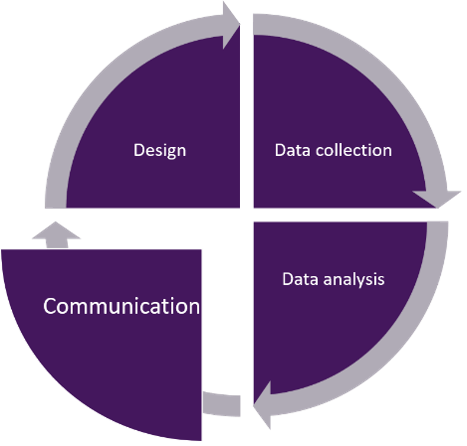
There can be many reasons for giving a presentation. You might want to start a discussion, persuade others to share your opinion, analyse some evidence, share information, inspire people to do something, communicate an idea, teach a topic, learn something, show what you’ve been working on ...
The purpose of the presentation affects the content you include and the style you choose to use.
Who’s in your audience and what do they want from your presentation ?
A presentation is a two-way activity. Thinking about your audience and developing a rapport with them keeps people engaged with what you’re saying or doing.
Very often, a presentation will include a space for audience questions or discussion. If you have kept your audience engaged throughout your presentation, their questions will be more closely related to the content, making it easier for you to answer.
- Thinking about your audience
- Starting your presentation
- The EPQ audience
Starting your preparation by thinking about your audience – who they are, what they want, what they are interested in, what they like, what they don’t like – will help bring them to life in your mind.
You can imagine their characters and personalities, their interests and responses. You don’t have to think about the life story of everyone in the audience – this is about broad descriptions. But thinking about the audience means that when you are creating your presentation, you are doing it with people in mind, helping you craft a presentation that engages them as much as possible.
As an example, look at the two people in Figure 2 (or read the description) and write down five words to describe them.

How did you describe them? You might have come up with:
- girl, writing, young, computer, relaxed, t-shirt
- man, banjo, musician, outdoors, beard
How can you use this description?
Think about starting your presentation .
If you think your audience is likely to be people like the young female writer, you could start with a (relevant!) quote from your favourite writer. For an audience of people that like to make music, you could include a piece of music that relates to your work.
Think about the content of your presentation. If you are presenting to a group of painters, you’d want to use lots of images. If you were presenting to very young children, you’d probably want to include some activities they could join in.
For example, Nisha, a researcher, gave a presentation at a science festival on the topic of ‘the future of space in society’. She characterised her audience as:
- more than 16 years old
- knowledgeable
- interested in the future
What does this mean for how she structured her presentation? Because she imagined her audience as adults , it’s likely she would have been comfortable discussing quite difficult topics and using complex language.
Thinking of them as knowledgeable means she would have been prepared for some interesting, and possibly tricky questions.
Visualising them as interested in the future means she would have included some material on new developments in research, and thought about the kind of questions they might ask about future work.
Who is the audience for your presentation?
For the EPQ, your audience is likely to be your fellow students and your teachers. These are probably people you know well, and who know each other well.
- What five words could you use to describe them?
What are the guidelines for the presentation ?
It’s always a good idea to know the guidelines for your presentation.
It’s helpful to have a few basic issues sorted out before you start preparing your presentation.
How long should your presentation be? Do you have to include time for discussion after the presentation or is that separate?
For EPQ presentations, different exam boards have different specifications about timing and format, so check the guidelines for the exam board you are studying with. A typical guideline might be that you should present for ten minutes, followed by five minutes for questions and discussion.
What equipment do you need?
Will it be provided or will you have to take your own?
Do you or the audience have specific needs that you should accommodate?
For example, you might be asked to use a microphone because someone in the audience has hearing problems. What kind of microphone will this be? One fixed to a stand or one you carry in your hand? How will using the microphone affect your planned presentation style? If it’s a fixed microphone, and you planned to move about while you present, you might have to change some elements of your presentation.
Where will you be giving the presentation? What kind of layout will the room have? How will this affect your presentation?
For example, will the audience be seated in rows (like a theatre), around a table (like people in a café), in an informal circle, or some other arrangement? Is the room layout fixed or can you re-arrange it to suit your presentation?
Who will be in the audience?
If you have read the previous section, you’ll have thought about this and how you can create a presentation that will appeal to them.
How many people will be in the audience?
This matters if you are planning to share handouts or ask people to look at visual aids or physical objects. You don’t want to have too few, but you don’t want to waste resources by preparing too much.
There are many different ways to present, so which kind of presentation should you choose? That depends on the kind of project you have done and the material you are presenting.
Every format has advantages and disadvantages. You will want to choose the format that works best for you and your work. Some common examples are:
Face-to-face oral presentation

Sometimes simply talking is enough. Telling your story directly to the listeners, with no distractions, is very compelling.
Oral presentation with visual aids

If you want to include evidence such as graphs, charts or images, using visual aids to support your presentation is helpful. Visual aids include presentation software (such as Microsoft PowerPoint, Prezi or Apple Keynote), wall displays, large posters or printed handouts.
Video presentation

You could choose to make a short video documenting your work. This allows people to look at or listen to the presentation in their own time.
This style of presentation is very appropriate for a project in which you have created an artefact or run an experiment and you need to show the whole process.
There’s more information about giving your presentation later in this article.
Structuring your presentation .
There will be a time limit on your presentation, so you should plan your presentation to be sure that you cover everything you need to.
- How many slides?
One way to allocate the time for the different sections is to think about the proportions you used for the dissertation.
Check out the previous article in this series ‘Writing up your dissertation’ for more info.
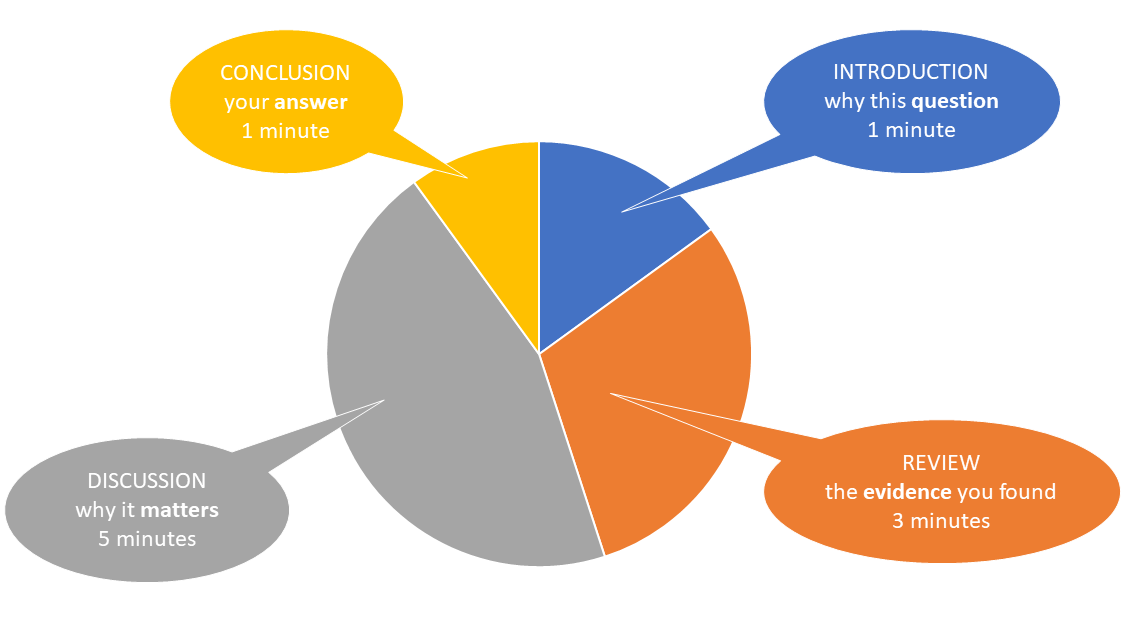
Introduction – 1 minute – why this question:
- the question you set out to answer
- why this question matters (perhaps to you, to your audience, to other people).
Review – 3 minutes – the evidence you found:
- a summary of how you carried out your research
- an overview of the evidence you found.
In three minutes, you probably won’t have time to cover all your evidence, so pick out the key points that are most important for you to explain.
If the audience knows there’s more you haven’t had time to say, they will be able to ask you questions about it.
Discussion – 5 minutes – why it matters:
- a summary of your key findings
- evidence for and against your question
- what the evidence means – how it helped you answer your question.
Again, in five minutes, you’ll only really have time to focus on the key points, so think carefully about what they are and which ones you want to present.
Conclusion – 1 minute – the answer:
- the answer your evidence has led you to
- the key message you want your audience to take away from your presentation.
How many slides should you make for your presentation? The most important thing to think about is how much time you have. Ann, who is a lecturer in astrobiology education and also teaches science communication, discusses this issue.
What are her suggestions?
When you’re thinking about creating the slides for a presentation, there’s a couple of good rules of thumb to remember. One is to stick to one idea per slide.
And the other is that it takes approximately two minutes to present a slide. So for a ten-minute presentation, you’re looking at maybe five slides.
If you divide them up roughly the same way as you divide the presentation itself, that will be one slide for the question, another slide to review the evidence that you found, perhaps a couple of slides on your discussion and analysis and one slide on the conclusion.
You can have a top and tail. It’s good to have a slide at the beginning with the name of your talk on it, and your name. This is a good one to have on display at the beginning, while people are settling down and getting comfortable. You can also have a closing slide that you can leave up to cover the question time.
Ann’s summary
If you plan to use presentation software, it’s tempting to cram in lots of slides, because you’ve done a lot of work and you want to share it all. However, your audience will need time to absorb the material you are presenting on your slides. If you have text, they need to be able to read it; if you have images, they need to be able to take in all the details. Good communication practice suggests that you should present one idea per slide, and that it takes roughly two minutes to present one slide. So for the example outlined in Table 1, that would mean:
- Introduction – one slide.
- Review – one or two slides.
- Discussion – two or three slides.
- Conclusion – one slide.
That’s approximately five to seven slides for a ten-minute presentation, with perhaps an additional opening slide to introduce yourself and a closing slide to cover the question time (Figure 7).
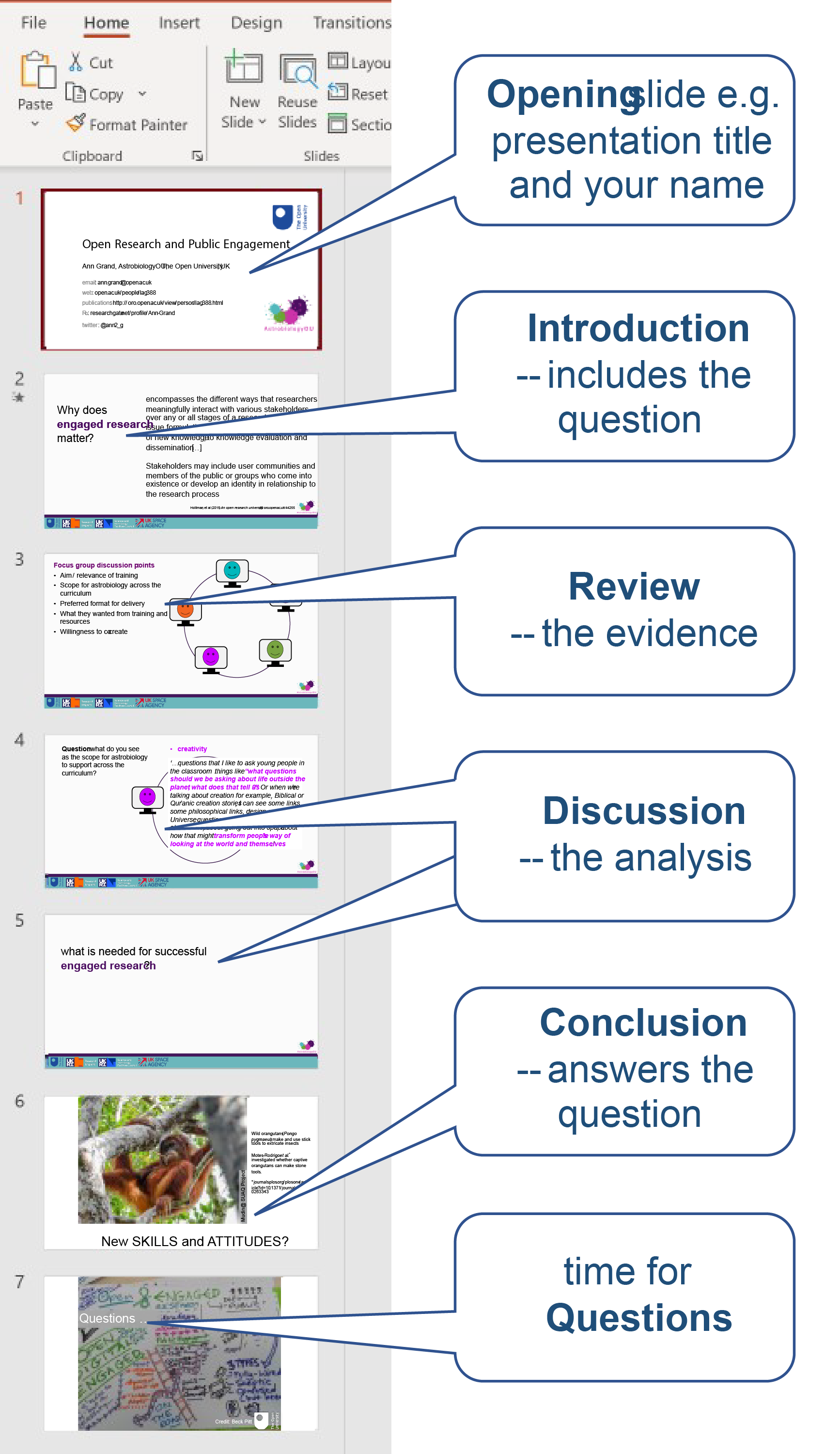
Using presentation software (such as PowerPoint, Prezi or Keynote) is probably the most common way of creating a presentation, but it’s worth taking a moment to decide whether this is the most appropriate route for the topic, the presentation and you.
- Should I use presentation software?
- Making it readable
- Using images
If you do decide to use presentation software, following a few simple guidelines will help keep your presentation interesting and impactful. When deciding, think about:
What’s best for your content?
- do you have a lot of images? (useful)
- are there graphs and charts? (useful)
- is it all text? (not so useful)
What’s best for your audience?
- how old are they?
- what are they interested in?
- where are you giving the presentation – small room, large theatre, in the dark, in artificial light?
What’s best for you?
- what skills do you have – can you draw really good images or take great photographs?
- can you sum up complex ideas in a few interesting words?
A good rule of thumb is to aim for presentation slides to be readable from 2.5m away.
Don’t try to crowd too much onto a slide. Aim for your text or images to take up no more than half the area of the slide. Keeping a good margin of white space around the content makes images easier to understand and text easier to read.
Using a widescreen (16:9) format for your slides gives you a larger area to work on, which means your images can be bigger and the text size can be larger.
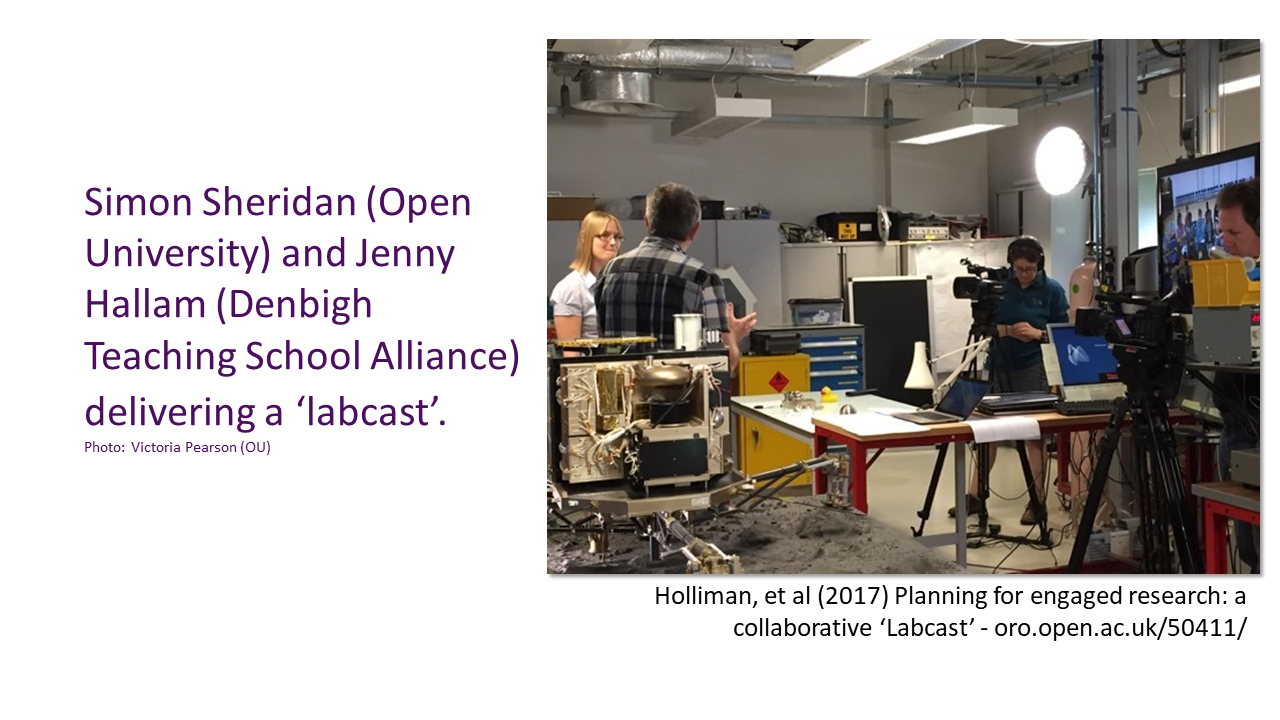
Compelling and relevant images that are easy to understand will hold the audience’s attention and support your storytelling.

In Figure 9, it’s easy to see that the young women are sharing their thoughts by writing on a large sheet of paper. We can speculate that some of them might be mothers, as there are young children and babies in the photo.

Compare that with the image in Figure 10. It’s not very clear – there’s some open water, a flock of pink birds that are possibly flamingos and a shoreline beyond them. It’s not easy to work out what the subject is: is it the water, the flamingos or the land on the horizon? If you used this photo, you would have to explain what to look for. That means the photo isn’t doing its job of enhancing your presentation.
Where to find images
If you have your own photos, drawings or images, that’s ideal, because they will represent your work most clearly. As the creator of the image, you own the copyright , so you can use the image in whatever way you want.
As discussed in our ‘Writing up your dissertation’ article, you should never try to pass off someone else’s work as your own. This applies to photos and images as well as text.
If you choose to use images created by other people, look for images that are in the public domain or have a Creative Commons licence, and in your presentation, include text that acknowledges where the image came from. Websites such as Pixabay or rawPixel offer lots of usable images, with full details of how you should acknowledge the creators. If you’re using Google Images, you can also click on ‘Tools’ and then adjust the ‘Usage Rights’ settings to search for re-usable material.
Using tables, graphs and charts
Presentation software, posters or handouts are excellent for showing tables, graphs and charts that illustrate your findings. When creating your presentation, you can re-use graphs and charts that you created for your dissertation.
For more information, see Article 1: ‘Writing up your dissertation – Tables, graphs and charts’ .
Less is definitely more when it comes to text on slides. Compare these two slides – which is easier to read and understand?
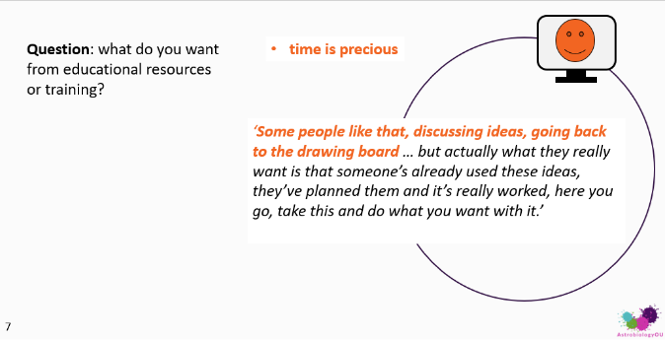
The first slide is much better. It has a pale grey background with five lines of black text, with a few words highlighted in orange. The second slide has a large image of a woodland as the background, with approximately 25 lines of white text. The text is almost unreadable.
Good communication practice suggests using:
- a maximum of 9 lines of text on a slide
- a maximum of 10 words per line
- an easy-to-read font; preferably sans serif (common sans serif fonts include arial, helvetica and calibri)
- large font sizes; ideally 36-point text for titles; 30-point and 24-point for body text
- black text on pale grey (or pale yellow or blue) background; good contrast between background and text is best for people with dyslexia and vision problems. Avoid stark white backgrounds, as the shininess can cause problems
- colours (up to five) for contrast and highlighting.
Giving your presentation .
We can learn a lot by watching and listening to other people give presentations, picking up from their good points and learning from what doesn’t go so well.
- Good presentations
- And not so good presentations
- Preparing to present – practising

What’s the best presentation you’ve ever watched online or been to? Perhaps you have a teacher whose style you admire, or you’ve been to a public lecture or talk that included presentations. What made them so good?
If nothing comes to mind, watch this presentation on The networked beauty of forests from the TED-Ed community to get your thinking started. The presentation lasts about six minutes.
As you watch, consider anything about it that appeals to you. What are its good points?
You might have come up with ideas such as:
- a title that grabs your attention
- clear and relevant images , graphs and tables
- use of relevant pieces of video , audio or music
- speakers who look like they really care about the subject
- speakers who keep up a good pace , not going too slowly but not rushing either
- being able to hear the speaker clearly
- being able to see the content clearly.
You probably came up with some other thoughts. How can you incorporate these ideas into your presentation?
Most of us have sat through presentations that weren’t very good. What problems did they have?
Watch this video , which was produced by Keele University, and use the bingo card below to identify some of the common mistakes made in presentations.
You probably spotted more problems than were included on the bingo card!
Of course, this was a deliberately bad presentation, but it gives us some clues about errors we can easily avoid. Sometimes speakers do things that irritate the audience because they’re nervous – people jangle keys in their pocket, chew their hair or constantly fiddle with a pen. Sometimes people don’t feel well-prepared so they read from a script, or they say ‘um’ or ‘er’ or ‘so…’ a lot. These are errors that we can avoid through good preparation and lots of practice.
Once you have designed your presentation, you need to think about how you are going to deliver it. What will you say as you present the slides?
Organise your notes
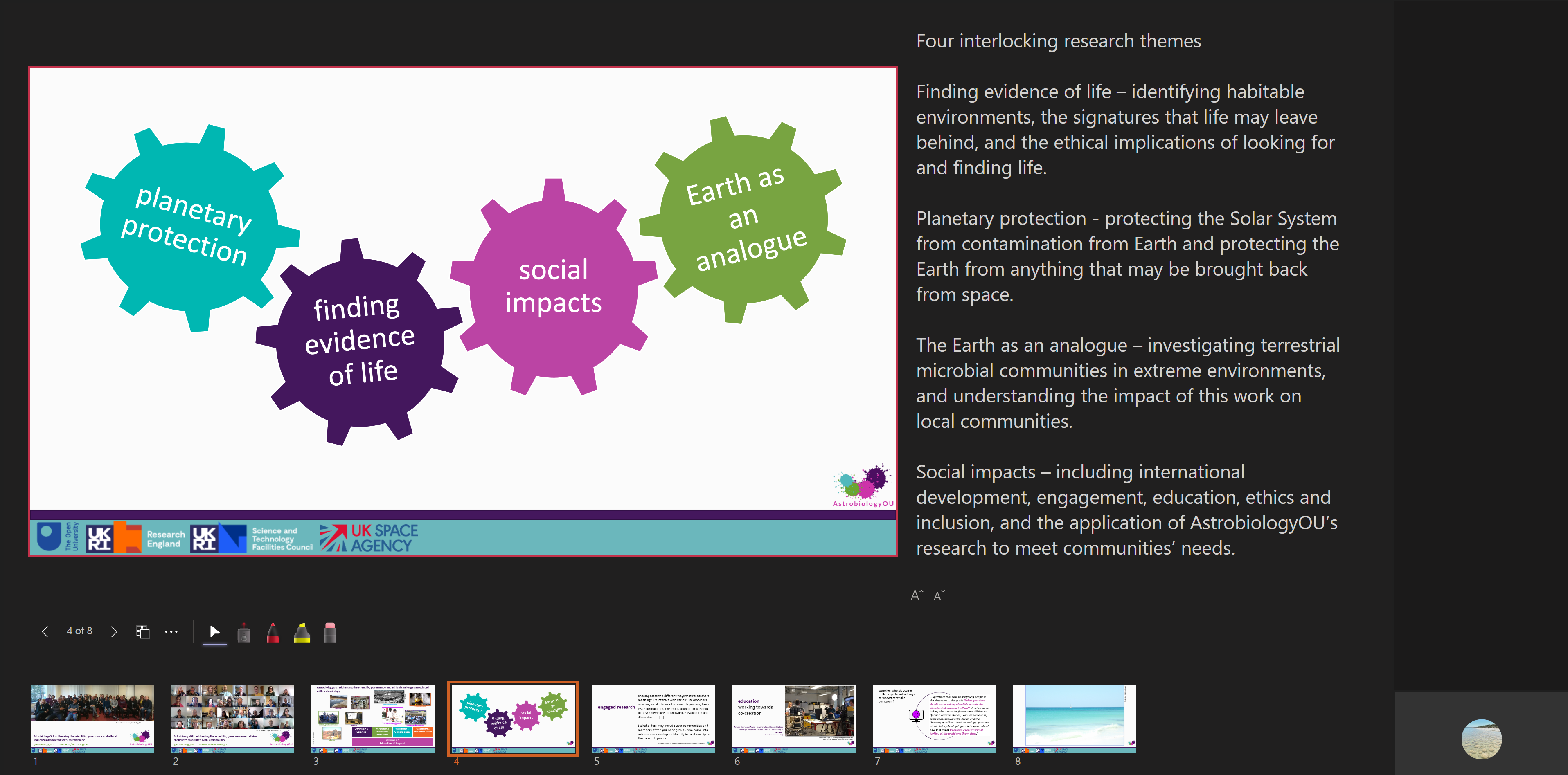
You might be very good at learning a script, but most people can’t remember the whole of a presentation by heart, and reading from a printed script isn’t engaging for your audience.
Therefore, many presenters use a ‘cue card’ system to keep on track:
- organise your notes into a logical series of points
- write a few reminder words for each point
- transfer your reminder words on to small cards (small enough to fit in your hand but big enough that you can read the reminder words easily; say 10cm x 5cm)
- have one card for the beginning, with your opening sentence written out
- have one card for the end, with a reminder of the message you want your audience to take away from the presentation
- fill in the middle with a card for each main point you want to make, or phrase you want to use.
When you are confident you have the right flow in your content, number your cue cards in sequence. Nervous presenters have been known to drop their cards and scatter them across the floor. If that happens, you’ll want to get them back in order quickly!
Practise giving your presentation as much as you can. Practise to your family, practise to your friends (and be an audience for them in return), practise to the cat or practise to a tree; the more you practise, the more confident you will be.
As you practise, you will become more comfortable with the sound of your ‘presenter’ voice and feel more like you’re talking as you would to a friend.
Something else to think about as you write your presentation is your speaking speed. You will find you need to speak more slowly when you are presenting, so that you deliver each word clearly. This means you can’t pack as many words into the minutes as you can in ‘normal’ speech.
Timing yourself over multiple practices helps you judge whether you have the right amount of content. If there’s anything there that doesn’t need to be there, this will give you the opportunity to cut it out. You might need to trim back and focus on fewer points, or you might find you have the space to add more material.
Practising also helps you ensure that the order of your points is logical and tells a coherent story. And finally, through practising you’ll be able to judge whether your visual aids (if you have used them) give the right message and enhance what you are saying.
Feedback from other people can be very helpful when you’re practising, especially if you ask for feedback on specific points that you are concerned about. Asking for targeted feedback on the delivery, the slides or the visual aids (or other points) is likely to be more useful than simply asking ‘what do you think?’.
If it isn’t possible to get ‘live’ feedback, you could video yourself and ask others to watch it back and give you feedback, or you could watch the recording yourself and reflect on the presentation. Not everyone enjoys watching themselves give presentations though!
On the day.
Remember:
- It’s your story – and you’re the best person to tell it.
- You’ve designed your presentation with the audience in mind (look back at ‘Giving your presentation ’ ).
- You’ve prepared great content (look back at ‘Guidelines’ and ‘Structuring your presentation’ ).
- You’ve designed excellent slides, posters or other aids (look back at ‘Presentation software’ ).
- You’ve timed and practised your presentation (look back at ‘Structuring your presentation’ as well as the resources below).
Look up, smile at the audience, take a deep breath and be great! Good luck!
More resources.
There are lots of resources available online to help you prepare and give good presentations. Here are two from the Open University that you might find useful:
- Communicating and presenting: skills for OU study
- Giving presentations

Other articles in this series...
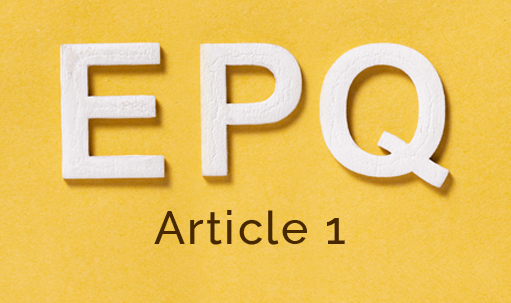
EPQs: designing your research question
You’ve already decided to do an EPQ, so it might seem a little odd to start this resource by asking you to consider why you want to do a research project. People do an EPQ for all sorts of reasons. Why do you want to do an EPQ?
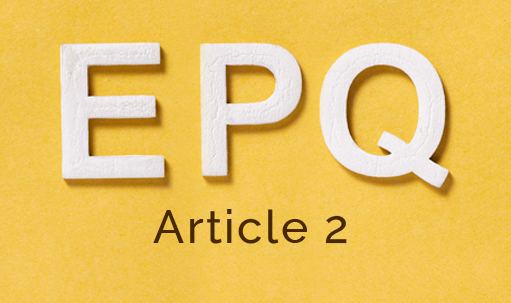
EPQs: finding and using evidence
Finding the evidence that will help you understand a topic or answer a question is an important stage in the research process. And once you have found it, you will need to examine it closely and carefully, to judge how reliable it is and whether it is useful to help you answer your question.
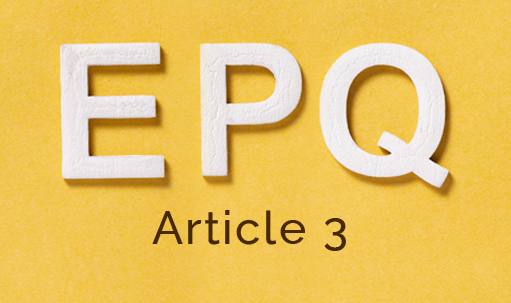
EPQs: writing up your dissertation
You have collected and analysed your evidence and considered it in relation to your research question. The next step is to communicate all that you have done. Your dissertation is the element of the EPQ that is read and assessed by others who haven’t been involved in your research.
Become an OU student
Ratings & comments, share this free course, copyright information, publication details.
- Originally published: Wednesday, 3 May 2023
- Body text - Creative Commons BY-NC-SA 4.0 : The Open University
- Image 'Fig 1 - The research cycle: Communication' - Copyright: Ann Grand
- Image 'A woman giving a presentation. She is pointing at an image displayed on a large monitor.' - Copyright: Photo by airfocus on Unsplash
- Image 'Fig 3 - Structuring a presentation' - Copyright: Ann Grand
- Image 'A powerpoint slide in wide-screen format' - Copyright: Victoria Pearson
- Image 'Women in a discussion group about health services for women and children' - Copyright: Voices from Durgapur (CC0)
- Image 'Photo of someone giving a presentation on stage' - Copyright: The Open University
- Image 'Screenshot of the presenter's view of an online presentation, showing the slide and notes.' - Copyright: Ann Grand
- Image 'Possibly flamingos? Photo by S. Filippidou, AstrobiologyOU' - Copyright: Sevasti Filippidou
- Image 'Example 1 of a slide' - Copyright: Ann Grand
- Image 'Example 2 of a slide' - Copyright: Ann Grand
- Image 'Possible audience members' - Copyright: Photo by Windows on Unsplash Photo by Meillene Ferrer on Unsplash
- Image 'Photo of someone presenting to an audience' - Copyright: Photo by Ben Moreland on Unsplash
- Image 'Photo of someone filming themselves' - Copyright: Photo by Jenny Ueberberg on Unsplash
- Image 'EPQs: why give a presentation?' - Alphabet Yellow © Betta0147 | Dreamstime.com under Creative Commons BY-NC-SA 4.0 license
- Image 'EPQs: writing up your dissertation' - © Betta0147 | Dreamstime.com under Creative Commons BY-NC-SA 4.0 license
- Image 'EPQs: finding and using evidence' - Alphabet Yellow © Betta0147 | Dreamstime.com under Creative Commons BY-NC-SA 4.0 license
- Image 'EPQs: designing your research question' - © Betta0147 | Dreamstime.com under Creative Commons BY-NC-SA 4.0 license
Rate and Review
Rate this article, review this article.
Log into OpenLearn to leave reviews and join in the conversation.
Article reviews
For further information, take a look at our frequently asked questions which may give you the support you need.
Extended Project Qualification Level 3
Back to courses
About this course
What is it.
The Extended Project Qualification (EPQ) is a nationally recognised and fully resourced qualification at Level 3. It carries up to 18 performance table points, or 28 UCAS points towards entry into higher education.
ASDAN’s EPQ is a single piece of work that requires a high degree of planning, preparation, research and autonomous working. This can be a 5,000 word dissertation or an artefact or performance accompanied by a 1,000 word report. The EPQ provides a unique opportunity to build the project around a work experience placement, offering a clear line of sight to employment and training.
Available for delivery in England and Northern Ireland, ASDAN’s EPQ has the same specification as those offered by other awarding organisations with an additional focus on completing the EPQ as part of a work placement.
We introduced the suggested delivery model, fully planned and resourced sessions to help learners develop the study skills required to complete their project. Access to all resources is included in ASDAN membership cost and are available to download on this page.
Read the abridged EPQ specification and view key dates .
"The new EPQ ASDAN is delivering gives students the opportunity to gain valuable employability skills through attendance at a work placement and completing a work-based project. We believe that successful completion of this qualification will prepare learners for further study and employment."
Katie Jenkins, Director, Marketing and Future Students, UWE Bristol
- Qualifications
Already a member? Sign in
Who is it for?
The EPQ is for students aged 16+ on a full-time programme of study.
ASDAN's EPQ can be used to complement vocational or academic learning; it provides learners with the skills that employers and higher education are looking for. The EPQ encourages independent study, critical thinking and teamwork – it is ideal for improving transferable skills such as planning, research, analysis and evaluation.
Facts and figures
- Available to centres in England and Northern Ireland only
- 120 hours total qualification time, including a pre-project taught element (30 hours)
- UCAS Tariff points are available on the Extended Project Qualification. For more information, please refer to ASDAN Qualifications key dates and performance information 2023-2024 .
- Students choose the topic for their project – it can be linked to their programme of study or a work placement
- Develops study skills and employability skills for progression to higher education and employment
- Supported by high quality teaching and learning resources
Students are free to choose the topic for their project, however they must show that it is useful for their progression and is linked to their programme of study or their future career.
ASDAN’s EPQ has the same specification as those offered by other awarding organisations with an additional focus on completing the EPQ as part of a work placement. This could be a dissertation linked to a work placement, or an artefact and report created as part of a work placement.
Assessment objectives
Students’ projects are graded based on four assessment objectives:
- AO1. Manage (20%)
- AO2. Use resources (20%)
- AO3. Develop and realise (40%)
- AO4. Review (20%)
Taught element
The ASDAN EPQ begins with a taught element (30 hours) to support learners in designing and carrying out their project.
Key documents
High quality resources are available to support learners, teachers, parents and employers involved in the ASDAN EPQ:
- EPQ specification (abridged)
EPQ key dates for centres
- EPQ Teacher guide
- EPQ What's in it for me? learner guide
- EPQ What's in it for them? parent guide
Other high quality key documents are available for registered centres to download via the members area . These additional resources include learner guides, a guide for employers, resources to support the pre-project taught element and mandatory forms.
The following documents are available to download for free:
- EPQ Suggested delivery model
Getting started
New to ASDAN?
Your first step is to become a member of ASDAN. Read more about our membership tiers and the benefits of being a member.
Already a member?
If you are on our qualifications membership and your centre has been approved to deliver qualifications, you can get started by purchasing materials below.
Please note that someone from your centre must have attended a mandatory training session or INSET prior to delivering this course.
You can upgrade your membership at any time under account settings .
ASDAN members' area
You can manage your courses, learners, orders and account settings in the members’ area . This also contains all the essential documents, forms and updates that you will need to deliver your course.
After students' work has been internally moderated, centres must submit candidate marks and send projects for external moderation, which is carried out by post. ASDAN will issue certificates following successful external moderation.
ASDAN training events are delivered by experts to enable your centre to successfully run our courses. They provide an introduction to the course, along with guidance on the processes involved, course delivery and moderation.
Training is mandatory for the Extended Project Qualification.
Book training
All candidate registration costs shown below are per candidate, unless otherwise stated.
Public funding for ASDAN qualifications delivered in the UK
Many ASDAN qualifications are fully funded by the UK Government.
Whether you are an employer, a learner or a training provider, the following websites will provide you with more information on the different types of public funding in the UK for ASDAN qualifications.
- England - Education and Skills Funding Agency, ESFA
- Wales - Qualifications in Wales, QiW
- Northern Ireland - Department for the Economy
Course resources
EPQ specification (full)
EPQ centre handbook
EPQ forms 1–12
EPQ centre declaration form
Qualifications EQA/external moderation sample centre checklist
EPQ teacher guide
EPQ suggested delivery model (taught element)
EPQ learner guide: areas of interest
EPQ learner guide: work experience
EPQ graded exemplar project
EPQ exemplar project with supervisor/assessor marks: dissertation
EPQ exemplar project with supervisor/assessor marks: artefact
EPQ exemplar project with supervisor/assessor marks: mandatory paperwork
EPQ internal moderation report template
Extended Project Qualification grade boundaries (most recent awarding period)
EPQ post results and appeal policy
EPQ application form for post results review and appeals
Principal Moderator report (most recent awarding period)
EPQ What's in it for them? parent guide
EPQ What's in it for me? learner guide
EPQ employer guide
Success stories
“asdan’s extended project qualification made me realise that university is an attainable goal.”, similar courses.
- International
- Schools directory
- Resources Jobs Schools directory News Search
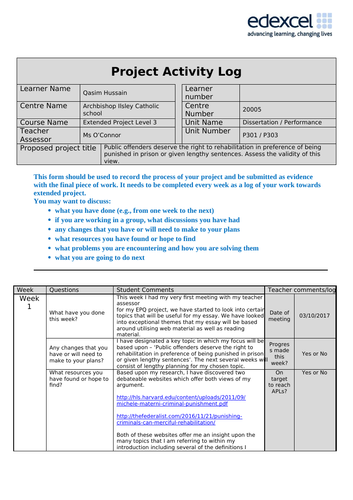
A* (53/54 )Extended Project Qualification (PEARSON EDEXCEL) L3 (EPQ)
Subject: English
Age range: 16+
Resource type: Unit of work
Last updated
2 July 2019
- Share through email
- Share through twitter
- Share through linkedin
- Share through facebook
- Share through pinterest

This is an A* EPQ dissertation for anyone taking part in the Edexcel variation. The piece received 53/54 marks and was also moderated to ensure it was a high A grade. * This is 50 page, and approximately 17000 word document. This is an an EPQ dissertation fully meeting every criteria outlined in mark scheme, clearly laid out and includes a fully descriptive and analytical activity log , which is the bulk of the marks for the EPQ. The question I answered was: ‘Public offenders deserve the right to rehabilitative programs in preference of being punished in prison or given lengthy sentences’. This is a great resource for any student doing an EPQ on law/crime/justice etc.
Tes paid licence How can I reuse this?
Your rating is required to reflect your happiness.
It's good to leave some feedback.
Something went wrong, please try again later.
This resource hasn't been reviewed yet
To ensure quality for our reviews, only customers who have purchased this resource can review it
Report this resource to let us know if it violates our terms and conditions. Our customer service team will review your report and will be in touch.
Not quite what you were looking for? Search by keyword to find the right resource:
Last places remaining for June 30th start. Don’t miss out. Enrol now to avoid disappointment
- 600 EPQ Ideas – The Ultimate List For an A*

So, this is it. You’ve decided to do an EPQ and now you’re sitting at a blank computer screen with the entire spectrum of human knowledge at your disposal. You could write about any topic on any subject in the dizzying realms of the known universe. But there’s just one problem… how do you begin?
An EPQ (Extended Project Qualification) allows A-Level students to write either a 5,000 word essay on any question or subject of their choice. Alternatively, students can create an artefact or product, and write a shorter essay explaining it. The EPQ is equivalent to half an A-Level.
EPQs are a fantastic way of proving to universities that you are the best prospective student for them, and that you deserve a place on one of their courses. An EPQ requires a huge amount of independent research (which proves that you can handle university-style work) and allows you to showcase your original thoughts and academic rigour, which is exactly what universities are looking for.
Even more importantly, an EPQ counts for extra UCAS points . This means that if you don’t get the grades you expect at A-Level, a strong EPQ grade could help you meet the conditions of a university place offer. Feeling inspired now? We’ve got 600 EPQ ideas for multiple different subjects, to get those ideas rolling.
What are some top EPQ ideas for a guaranteed A*?
Some strong EPQ ideas for a guaranteed A* are specific and original topics like “Should parents be allowed to genetically change their child’s gender” for an EPQ in medicine, and “Is the media making suicide aspirational?”, for a psychology EPQ.
You could also consider EPQ questions like, “Was the bombing of Hiroshima and Nagasaki justified?” for History, and “Should we legalise human organ trade?” for Economics.
We’ve got a list of 600 EPQ ideas for a guaranteed A*, so scroll down and get inspired. We’ve searched all over the internet and interviewed students to get the most pressing topics for each subject. You should just use these EPQ ideas to give you an idea of what you could research, and it’s up to you to come up with your own title.
EPQ Ideas For Medicine
- Is gene therapy ethical?
- Should parents be allowed to genetically alter their child’s gender?
- Can cannabis use in adolescence cause schizophrenia?
- To what extent does the sugar tax reduce sugar consumption in the UK?
- Why are the death-rates from Covid-19 worse in places with higher air pollution?
- Why does emetophobia primarily affect women?
- Could the legalisation of cannabis improve mental health?
- Should we allow only UK citizens to use the NHS?
- Can plastic surgery ever solve body dysmorphic disorder?
- Do care home environments worsen the affects of Dementia and Alzheimer’s?
- What are the links between obesity and parents criticizing their children’s bodies?
- If a woman who wanted a child freezes her eggs and then happens to die, should a relative be allowed to use her eggs to conceive a child?
- Is it right that mothers of Down’s syndrome babies are allowed to abort them up until birth?
- Are anti-depressants a quick fix problem in an overwhelmed healthcare system?
- Should the NHS provide IVF for women over 40?
- To what extent are Black women discriminated against when giving birth?
- Should counsellors have a qualification in psychology before being allowed to practice?
- Why are girls so chronically misdiagnosed when it comes to autism?
- Did the ancient Egyptians have a comprehensive understanding of mental health and illness?
- Could electroshock therapy be the most effective method of treating depression?
- Should we prioritise ICU places to people with children and dependents?
- What are the similarities between Reactive Attachment Disorder and Autism?
- A study of medical practices in North Korea
- A comparison of different cancer treatments: surgical removals and chemotherapy to immunotherapies.
- Is hypnotherapy ever a viable anaesthetic for surgery?
Students interested in taking medicine further should consider studying at one of our award winning Medicine Summer Schools to strengthen their application.
EPQ Ideas for Psychology
- Is the media making suicide aspirational for young people?
- To what extent does having social workers intervene in a family affect a child’s life outcomes?
- Is talking therapy nearly ineffective for treating panic disorder?
- Should children be allowed to decide if they can be taken into care?
- Are the children of alcoholics more likely to become hoarders?
- Is there a link between undiagnosed Autism Spectrum Disorder (ASD) and alcoholism?
- Can non-violent psychopaths have successful relationships?
- Given how they change behaviour, should advertising and marketing be made illegal?
- How has social media altered our brains since its inception?
- Does the Stanford Prison Experiment prove that we should promote rehabilitation over punitive incarceration?
- Are attachment issues in neglected children irreversible?
- Can unschooling be classed as child neglect?
- Can authoritarian parenting styles lead to overeating in adulthood?
- Is technology making us more depressed?
- Do gender-neutral toys lead to children with less stereotypical views of gender roles?
- Can music help ease the effects of Dementia?
- What are the long term effects of bullying?
- Can studying people’s behaviours pre-suicide help prevent suicide?
- Should crime-predicting algorithms be banned for their bias?
- A study of the effects of living in an overcrowded household during Covid-19 lockdown.
- Do memories alter when we recall them?
- How does intergenerational trauma effect cortisol levels?
- Do the negative affects of racism begin in the womb?
- What can Savant Syndrome tell us about the multi-faceted nature of intelligence?
- Do all humans have some level of body dysmorphia?
EPQ ideas for Law
- Should defendants be allowed to represent themselves?
- Is the internet an ungovernable wilderness when it comes to Law?
- Why secret trials are a form of abuse
- Should CCTV be made illegal?
- Is the use of juries inevitably flawed when it comes to reaching a just verdict?
- Should mass media be banned from high profile investigations?
- Should we replace juries with AI-powered robots?
- Should Donald Trump go to prison?
- Could the police be classed as a gang in America?
- How we can stop criminalising victims of sex trafficking.
- Should we bring back the death penalty?
- How much should a child’s desire to live with one parent or another affect the court’s decision?
- Should people who see child abuse but don’t report it be subject to the law?
- Should male partners sue their female partners for abortion?
- Should organ donation be mandatory for everyone?
- When should one country legally intervene in another, when it comes to human rights abuses?
- Should marriage be banned until the age of 21?
- Should lie detector results be legalised in UK courts?
- Could the government be legally obliged to pay women for their unpaid labour that contributes to the economy?
- If embryos are capable of feelings and sensations, should abortion be forbidden at any stage?
- Should minors trafficked to the UK from a dangerous country or situation be given immediate residency?
- Could euthanasia be legalised, whether or not someone is critically ill and close to death?
- Should parents be legally obliged to leave money to their children?
- Should the inheritance tax be abolished?
- Should people with dual citizenship automatically receive diplomatic protection from both countries?
Students interested in becoming a lawyer should consider studying at one of our Law Summer Schools on campus at top UK and US universities.
EPQ ideas for primary school teaching
- Should boys receive exclusive lessons on feminism in primary school?
- How can we teach primary school students about internet safety?
- How can we teach primary school students about their rights over their own bodies?
- Is the way we teach obesity in school harmful to overweight or obese children?
- Is the Education system indoctrinating students?
- The importance of girls in primary school having role models in STEM.
- Why banning mobile phones in school does more harm than good.
- Why our education system fails to pick up students with dyspraxia.
- Why we should allow students to move around the classroom as they learn.
- Is the Montessori childrearing method of any use in mainstream primary school?
- Should every school have access to a Forest School?
- Why primary schools should teach skills such as cooking and home management to every child.
- Are school uniforms too institutionalising for children?
- Should school uniforms be enforced as a way of giving children routine?
- The importance of failing well.
- Should school be only three days a week?
- Should children be able to choose what subjects they want to study at any time?
- How exams unfairly disadvantage girls in primary school.
- Should we abolish sets in primary school?
- How can we teach healthy eating to children?
- How can we teach anti-racism to primary school students?
- A study of anxiety disorders in primary school students due to Covid-19.
- How the education system can better accommodate students with high-functioning autism.
- Why we need a better understanding of selective mutism in primary school.
- Should primary schools in the UK become bilingual to enhance language learning?
EPQ ideas for Secondary School Teaching
- Should school start and end later for teenagers?
- Why students should never have to ask to go the bathroom.
- Could a four day school week improve mental health among secondary school students?
- Is the secondary school curriculum creative enough?
- Why we should be teaching healthy communication to secondary school students.
- Should parents be allowed to choose for their children not to receive sex education?
- Should sports be compulsory at secondary school?
- When does strict teaching become bullying?
- Should modern languages be compulsory at secondary school?
- Could Pathological Demand Avoidance explain why students who are bright aren’t meeting their potential?
- Should we ban school uniform in secondary school?
- Should we decolonise the secondary school curriculum?
- Are their enough teachers of colour in secondary schools?
- What is the effect of divorce on a student’s learning and development?
- How to narrow the technology poverty gap among secondary school students.
- How to create educational support for looked-after children.
- How does having less money than your peers affect your identity as a secondary school student?
- The effects of overcrowded and poor housing on educational attainment.
- The effects of homelessness and insecure housing on educational attainment.
- What effect does the assessment and exam structure in UK schools have on students’ mental health?
- Are exams an unfair form of assessment for students with a specific learning difficulty like dyslexia or dyspraxia?
- How does ADHD link to cleverness and giftedness in students?
- Is our method of diagnosing autism in students informed enough?
- How can we tackle perfectionism and fear of failure in female students?
- Do exams unfairly advantage boys, and why?
EPQ ideas for Biology
- Why we don’t have enough evidence for evolution.
- Is Covid-19 more deadly than Ebola?
- Are animals as intelligent as humans?
- Is abortion murder?
- Is homosexuality genetic or social?
- What can the oldest living creature on earth teach us about biological immortality?
- Does incest always create biological issues?
- The use of parasites in weight loss attempts
- How long would it take you to die if you ate the same thing and nothing else for years?
- What causes diseases in trees?
- Could we ever grow food on walls?
- If your spouse died, what would the ethical implications be of cloning them?
- A study on identity crises in identical twins.
- Is obesity a genetic issue?
- How does sepsis attack the body?
- Will artificial hearts ever be a viable solution to chronic heart problems?
- Could brain transplants ever be a viable option?
- How do certain drugs affect cellular interactions?
- A study of courting behaviours in different species.
- How did different cellular mechanisms regulate different physiological processes?
- Is obesity a modern phenomenon?
- Can gene therapy cure Cystic Fibrosis?
- Can gut microbiota influence host appetite?
- What is the impact of invasive species on ecosystems?
- What is the biology of laughter?
EPQ Ideas for History
- Why poor dental hygiene in the middle ages was a myth.
- Was the bombing of Hiroshima and Nagasaki Justified?
- Is it right to topple the statues of slave owners, in order to erase history?
- Who does history belong to?
- Why did the USA join World War Two so late?
- How have male and female romantic relationships changed over time?
- How has the role of marriage changed over time?
- Should a country be allowed to teach its own history?
- How did the British Empire expand so much?
- Should museums return all their historical artefacts to their country of origin?
- Were the Suffragettes the biggest force in women getting the vote?
- Is religious warfare ever Justified?
- How medieval fashion influences our outfits today
- Was Anne Boleyn the main reason that Henry VII left the Catholic church?
- Did Henry VII suffer from a genetic disease that prevented him from conceiving healthy children?
- Why do we hold on to so many myths in History?
- A study of propaganda in History textbooks in UK history.
- Why is History important to the future?
- To what extent did the purchase of commissions affect the fighting power of the British army between 1760-1860?
- What is the validity of historical fiction and romance?
- How did secret churches operate in Mao’s China?
- How did 19th Century attitudes towards madness affect society’s treatment of ‘hysterical’ women?
- What is the holocaust’s relationship with literature?
- Were the liquidators who helped clean up the Chernobyl explosion used as human collateral?
- How did the pill help women’s liberation?
EPQ Ideas For Economics
- From an economic perspective, should we legalise human organ trade?
- Can an increase of wealth directly influence happiness levels?
- Could stock analysts be replaced by artificial intelligence?
- How do socio-economic factors determine someone’s health in adulthood?
- Who is to blame for the 2008 financial crisis?
- Is illicit trade with China the only factor preventing the North Korean economy from total collapse?
- How would we recover economically if the internet ceased to exist?
- How did the 2008 financial crisis make house buying impossible for the majority of millennials?
- Is the poverty trap impossible to get out of?
- Can we compare the trickle-down economy to a pyramid scheme?
- Does a lack of wealth in childhood really hold you back in life?
- Is the gig economy leading to job insecurity a myth?
- To what extent does women’s unpaid labour prop up the UK economy?
- How has Brexit affected the UK economy?
- Should we legalise a Universal Basic Income?
- How quickly did the UK economy recover from the effects of World War Two?
- Are all socialist economies doomed to fail?
- How would the legalisation of Marijuana affect the world economy?
- How does a lack of free speech negatively affect China’s economy?
- Should there be a minimum wage?
- Should there be a maximum wage?
- Should billionaires be allowed to exist?
- How has the global demand for oil changed over time?
- What effect does illegal immigration have on the UK economy?
- Why a lack of childcare support for women hurts the economy.
EPQ Ideas for Business Studies
- Should businesses expanding to developing countries be forced to pay their employees the same amount they would at home?
- What does Foxconn show about the human cost of business?
- How should we hold businesses to account for unethical behaviour?
- Should we have a single, global currency?
- How can companies become more eco-friendly?
- Should we lower the corporate income tax?
- Will Google kill the journalism industry?
- Why apprenticeships should pay more
- Why every business leader should take a course in empathy.
- How successful is it when businesses rebrand?
- Should companies interfere in their employees’ private lives?
- How churches like Hillsong became multi-million pound businesses.
- Should CEOs have a salary limit?
- Is the American government a big business?
- How has e-commerce affected bookshops?
- Does corporate social responsibility have an impact on company sales and profits?
- A study of businesswomen in the 18th Century
- When do business marketing practices become unethical?
- Should multi-million pound businesses have taken advantage of the government’s furlough scheme during the Covid-19 lockdown?
- How do corporations influence politics?
- Should a business ever own a town or city?
- Start your own small business – perhaps on eBay or Etsy – and write your EPQ on an aspect of it.
- Should private healthcare be allowed to exist?
- Could marketing be considered a mass human experiment?
- To what extent does colour effect audience response to branding and logos?
If you want to study economics, business or marketing to a higher level, consider joining Oxford Royale this summer for a Business Summer School .
EPQ Ideas for English Literature
- The evil stepmothers in fairy tales were actually mothers in the original texts. What does this tell us about society’s anxieties and perspectives on motherhood?
- To what extent is the state of Gilead in The Handmaid’s Tale based on real life?
- Is writing an act of magic?
- Can works of literature oppress their fictional, female characters?
- Can the mistranslation of literature create a liminal world – a place that is not quite one thing and not quite another?
- What does the rise of the digital book teach us about literature?
- Can we ever ‘eat’ literature?
- Do you need to be able to read and write to be an author?
- Are stories living things?
- Discuss the gender politics in George Eliot’s Middlemarch.
- How is the sensory experience of dyslexia presented in literature?
- Is English Literature considered a ‘feminine’ subject?
- As an English student, is it your job to always work out what an author means?
- Is the author dead?
- Could journalists be replaced by AI-reporters?
- Do we need to overhaul the literary canon?
- Do we really need spelling and punctuation in literature?
- Should mass media be allowed to be biased?
- How helpful is the idea of literary genres to understanding a text?
- How George Orwell hid his dissenting view of communism in Animal Farm.
- Why learning to read is a human right.
- Can a novel ever be timeless?
- Does literary form exist just so that writers can subvert it?
- Is rhythm in a poem a separate language?
- Explore Plath’s portrayal of depression in The Bell Jar.
EPQ ideas for Art
- Should Banksy be allowed to graffiti on walls?
- Who decides the value of art, and should we standardise it?
- Has photography always been a form of art?
- To what extent is mathematics art?
- Why do people consider art to be an easy subject?
- Can art reverse the effects of mental illness?
- Can anything be art?
- Is all graffiti a form of art?
- Why the common perception of medieval people being bad at art is misguided.
- How does the commercialisation of the art industry change art itself?
- How does the perception of a career in art as worthless affect the life choices of students?
- Does an audience’s gaze change a piece of art?
- Are art and beauty essentially related?
- Is art supposed to be a visual and sensory experience, or something that we think about and define a meaning for?
- Who decides that a piece of art is ‘good’?
- Does art have a purpose?
- Can art help fight climate change?
- Why does it matter that children are exposed to art?
- What is the effect of producing art on a child’s brain?
- If nobody ever saw your artwork, would it be worth creating?
- Does a piece of art necessarily have a relationship with its creator, or can it detach itself?
- Is art a language?
- What does the disdain for modern art teach us about people’s stereotypes of art?
- Are philosophers artists?
- Could the world itself count as a work of art?
EPQ Ideas for Foreign Languages
- Where did language come from?
- Do idioms prove that languages can never truly be translated?
- Is body language universal across all countries?
- Should everyone be made to learn sign language?
- Why did Esperanto fail as a language policy?
- Which is the hardest language to learn and why?
- Do multi-lingual children grow up to be more economically successful?
- Why does having dyspraxia make language learning difficult?
- Should the whole world be made to speak one language?
- How does an influx of immigration alter the language of a region?
- What is the effect of trading on local dialects?
- Should everyone be made to learn a foreign language at school?
- What does the Korean language, when compared in North and South Korea, teach us about the evolution of language?
- Is there such a thing as a ‘correct’ way of speaking a language, when languages never stop evolving with culture?
- Could a language be classed as a living thing?
- Why is English such a dominant language across the world?
- Is Latin a dead language?
- What caused the English language to evolve so drastically over time?
- What is the hardest language to learn, and why?
- What does baby-talk in different foreign countries teach us about the acquisition of language?
- Why does China have several dialects, but only one alphabet?
- Did grammar always exist?
- What is the link between being good at maths and being good at language learning?
- Why are young children such natural language learners?
- Is learning a language cultural appropriation?
EPQ Ideas for Sport
- How sports stars experience an identity crisis after they retire
- Should soldiers be paid more than footballers?
- How do psychological factors influence performance in sport?
- What do fans react to their team winning a football match as though they won it themselves?
- Are national and international sports a misuse of resources?
- How does struggling with sports in primary school affect children’s self esteem?
- Should women be allowed to compete against men in professional sports?
- Is the ability to run fast purely a genetic advantage?
- Why do we fail to take women’s sports seriously as a society?
- Should children be forced to do sports in school?
- How can the presence of media affect the outcome of a game?
- Should referees be replaced by AI-powered robots, to decrease bias?
- How does a lack of female representation in sport prevent girls from seeking it out as a career?
- What is the effect of parents’ motivation a child’s enjoyment of sport?
- What are the long term effects of the Olympics on the host country’s tourism?
- How does a lack of ability at sports correlate to bullying?
- Why do we have less interest in women’s sports?
- A history of sport in pandemics
- How does a long-term sports injury affect an athlete’s mental health?
- Can a star athlete succeed without a coach?
- Should cheerleaders be banned?
- Is racism being taken seriously in sport?
- Can you still be a top athlete with a poor diet?
- Who decides when something is a sport?
- Why is netball predominantly considered to be a sport for women?
EPQ Ideas for Architecture
- How does the design of a building influence its inhabitants emotions?
- Should city-dwellers without gardens be given free access to national parks at all times?
- What is the link between Brutalist style architecture and anxiety and depression?
- What is the link between mathematics and art in Architecture?
- How is a building affected by the people who live in it?
- How does the style of council housing feed into class stereotypes?
- Can architecture cause social dysfunction?
- Would smart cities be a breach of privacy?
- Could we create a building the size of a city, to house an entire population?
- Make an architectural model of a zero-carbon home and write an essay describing how its functions avoid the use of carbon.
- Should the local government have the right to pull down a building if the community who live there oppose it?
- Is it ethical to spend millions of pounds creating a building in a city with high levels of quality?
- Were houses built in the 1930s of superior quality?
- Should councils have been allowed to remove tenement dwellers from their homes in the post-war era, when the enforced move was traumatic?
- Can we adapt Japanese smart space efficient buildings to western buildings?
- What were the influences on architecture in China?
- How did communism during Mao’s China change the country’s cityscapes?
- How can we build environmentally-friendly housing in LEDCs?
- Can zero carbon housing ever really exist?
- Should public playgrounds exist for people of every age?
- Was Grenfell tower a total architectural failure?
- What house styles in different areas tell us about gender forms of the time.
- How does technology affect architecture?
- What was the effect of feminism on architecture?
- Should houses worth over a million pounds be built with some benefit to the whole neighbourhood?
Join our Oxford Architecture Summer School for the chance to learn architecture amongst the dreaming spires of the city of Oxford.
EPQ ideas for Maths
- Is the golden ratio a racist idea?
- What is the maths behind cryptocurrencies?
- What are the links between foreign language learning and maths?
- What are the links between mathematics and art?
- Has maths always existed?
- How can we use statistical analysis to predict a child’s outcomes in life?
- Should children be forced to take maths at A-Level in the UK?
- Should maths be optional at secondary school in the UK?
- Why do some people say that maths is beautiful?
- Does money really exist?
- An exploration of chaos theory.
- Can maths explain how the universe came into existence?
- How can calculations improve the safety of commuters who cycle in Oxford over the next 5 years?
- Explore conflict and co-operation in The Prisoner’s Dilemma.
- Which is more important, e or pi?
- Can we calculate infinity?
- An exploration of orbital mechanics.
- Is maths a pointless subject if we don’t apply it to something?
- Is learning Maths more important than learning English in primary school?
- What was the role of maths in the code-breaking of Bletchley Park?
- How do fractals work in modelling systems?
- Can we reverse dyscalculia?
- Can mathematical systems ever be illogical?
- Did people discover maths?
- Could maths ever prove the existence of a parallel universe?
Those keen on studying maths in the heart of the silicon valley can join our Mathematics programme for 15-18 year olds on campus at our Berkeley Summer School in 2024.
EPQ ideas for Physics
- How does String Theory explain the universe?
- How can physics help us prevent climate change?
- What is the relationships between maths and physics?
- What was the role of Mileva Maric Einstein, Albert Einstein’s wife, in his scientific findings?
- Build a quadcopter with remote control.
- How can emergency whistles be optimised for design and use in rural environments?
- What would happen to the solar system when the sun dies?
- How can physics help us provide electricity to parts of rural India?
- Is time an illusion?
- Discuss the different interpretations of quantum mechanics.
- Could humans ever live on Mars?
- Design and build a functioning robot.
- How soon will we have flying cars?
- What are some feasible methods for cleaning up space junk?
- Where did the universe come from?
- How can physics prove the existence of God?
- How did Einstein’s theory of relativity influence Physics?
- Now that NASA has confirmed there is water on the moon, could it be a feasible tourist destination?
- Given their devastating effects, should we eliminate nuclear weapons from the earth?
- What contributed to the Cleddau bridge disaster?
- How can we solve the pay gap in the field of physics?
- A study of star formation and star death.
- Is time travel possible?
- How far can humans realistically explore space?
- Mathematical knot theory and its applications.
EPQ ideas for Chemistry
- What was the impact of optical isomerism in the drug Thalidomide, which led to fetal abnormalities?
- An assessment of the safety of fluoride in water.
- To what extent did the government in Louisiana cover up the danger of the petrochemical plants in Louisiana’s ‘cancer alley’?
- Should Aspartame (E951) be allowed in our food and drink?
- When do chemicals become hallucinogens?
- An assessment of hydrogen storage within Metal-Organic Frameworks (MOFs).
- An extraction of limonene from citrus fruits.
- Make a collection of esters that smell pleasant.
- Will graphene have a significant influence on the future?
- To what extent have inventions in Chemical Engineering impacted our lives?
- As assessment of the total synthesis of natural products.
- An experiment in polymer chemistry.
- An assessment of molecular dynamics
- An assessment of solid state structure
- Could we ever create a plastic that decomposes?
- A research project on hydrogen fuel cells
- Why doesn’t plastic decompose?
- What are the chemical processes behind purifying water?
- An exploration of the chemistry behind food allergies in humans?
- What are the chemicals involved in human attraction?
- How does cortisol affect the human body?
- Should pesticides be ethically permissible?
- What are the advantages of computer aided fragment based drug design?
- How can click chemistry be used to improve drug synthesis?
- How has the discovery of pharmaceutical chemicals changed over the past 200 years?
EPQ ideas for Engineering
- Should we teach Engineering in primary school?
- Why is there a gender imbalance in Engineering, and how can we fix it?
- Is there an oversaturation of engineers in India, and if so, why?
- Was everything in the world built by an engineer?
- Do we need to expand our definition of engineer?
- Can Engineering solve the mystery of Malaysian Airlines flight 370?
- Can Engineering explain the disappearance of Emilia Earhart?
- Did Engineering faults contribute to the sinking of the titanic.
- Build your own model plane, boat or high altitude balloon.
- Could hot air balloons become a mainstream method of travel?
- Discuss the hydraulics paradox.
- How have innovations in airframe design increased safety in commercial aircraft?
- How do architects and engineers collaborate?
- Should we be allowed to develop robots that can mimic human emotion?
- What would it mean for an engineer to be ethical when building something?
- How has Civil Engineering changed over time?
- How can chemical engineers improve energy efficiency?
- How could alterations in chemical Engineering have prevented the Deepwater Horizon oil spill?
- As assessment of the sustainability of London’s tube system.
- How much of our countryside should we sacrifice for better transport links?
- Will we have enough oil for future generations?
- Would energy provided entirely by a wind farm system run the UK economy?
- What are the reasons for the pay gap in Engineering, and how can we solve them?
- How can we get pre-school children interested in Engineering?
- Design a system to enhance plastic recycling.
Prospective engineers can join our Engineering Summer Schools for a two-week immersion in the core principles of the subject.
EPQ ideas for Computer Science
- Why we should teach children how to code at the same time we teach them to write.
- Create a website design and code it.
- Is one coding language superior to another?
- How can we reduce computer illiteracy in poorer areas?
- Why internet access is a human right.
- Are AI-driven robots responsible for their own actions?
- Are Ai-assessed job interviews inevitably biased?
- How soon will handwriting become totally irrelevant?
- Are companies upskilling fast enough to cope with the digital demands of Covid-19?
- It’s more important to learn to code than to learn to write
- Is Computer Science a more relevant subject than Physics?
- How will quantum computers change our way of life?
- Should silicon valley companies be criminalised for our widespread addiction to technology?
- What would happen if all technology was wiped out?
- Will we ever be able to search Google through a microchip in our brains?
- What new jobs will Ai create in the next ten years?
- What is increased automation doing to our jobs?
- Develop your own game.
- Should we allow AI-writing assistants like Grammarly to change the way we express ourselves?
- What are the positive effects of machine learning on healthcare?
- How does AI differ from human intelligence?
- Is it ethical to use social care robots to alleviate loneliness?
- Is it ethical to create an app which offers you an AI friend?
- What is the most efficient way to track down cyber criminals?
- How do cyber criminals cover their tracks on the internet?
EPQ ideas for Ethics
- Should people be able to sue their parents for bringing them into the world?
- Do men automatically have the right to be present at their child’s birth?
- Should we be allowed to dispose of spare embryos in IVF?
- Should we be allowed to use embryos for stem cell research?
- Should machines with AI have their own rights?
- Are Siri and Alexa slaves?
- Should we be allowed to mix human and animal DNA?
- Should we be allowed to clone humans?
- Do we have the right to experiment on animals?
- Do we have the right to visit other planets and the moon?
- Should a father have rights over an unborn child?
- Should there be an assessment process before people have children?
- Is sterilisation unethical in every circumstance?
- Should we be allowed to cuddle babies if they can’t give verbal consent?
- Should an embryo have protected rights under the law?
- Do we have the right to prevent someone from committing suicide?
- The disturbing eugenics around birth control
- Should parents be allowed to edit out genetic conditions before a child’s birth?
- Should testing fetuses for Down’s Syndrome be legal?
- Are our moral decisions innate or socially conditioned?
- Should we have the right to decide when life begins?
- If you need a heart transplant and you’re hoping for a heart, does that mean you’re hoping for someone else to die?
- Should we put a limit on the number of children people have?
- Does the means justify the end?
EPQ ideas for Politics
- Why has the USA never had a female president?
- If we colonised Mars, who would govern it?
- Has Great Britain lost its status as a world power?
- Are the government’s counter-terror policies effective?
- Is it acceptable to teach British values in primary schools?
- How does nepotism negatively affect politics?
- How has Donald Trump changed politics?
- Should there be universal freedom of information?
- Why did Brexit happen?
- What are the dangerous effects of conspiracy theories like Q-Anon on the public?
- Should it be illegal to publicly shame politicians?
- Will there ever be a viable mid-ground between socialism and capitalism?
- Would global governance be a better policy than individual governments?
- How are female politicians and prime ministers perceived?
- Should there be freedom of speech at all costs?
- Should countries be allowed to ban religion?
- An assessment of the case for anarchy.
- Should the UK’s land belong to everyone?
- An analysis of political cartoons in the UK
- Should everyone have to vote by law?
- Should politics be taught in primary school?
- Should everyone be made to take politics in secondary school?
- Should National Service be mandatory in Singapore?
- How did the war on drugs affect inner city US communities?
- How was Twitter revolutionised politics?
Sociology EPQ ideas
- How can we reverse stereotypes over drug use and misuse in different communities?
- What is the impact of the media on our perception of women from Muslim communities?
- Evaluate Marx’s account on the origins of the industrial revolution in Britain?
- Is it fair for today’s feminists to criticise the lack of gender commentary in classical sociology?
- How do human ideas, customs and behaviour come together to make culture?
- How do gender, class, race and sexuality affect us and our social relations today?
- A study of the effects of polyamorous family settings on children.
- Have sociologists neglected emotion in their studies of human behaviour?
- Do emotions come from society, or from within us?
- How do different models of socialisation affect children?
- Are eating disorders a social phenomenon?
- Should we ban face-altering apps?
- Should teenage pregnancy be so vilified?
- Can upbringing create a narcissist?
- Is perfectionism more prevalent in girls than boys, and how does that relate to the way we socialise either gender?
- Should we ban gendered toys?
- How can we assuage the social causes of substance abuse?
- An exploration of the sociology of food.
- Is it right to try and get someone out of a cult?
- How racial segregation in cities enforces poverty, and prevents upward mobility.
- What is the relationship between race and class?
- The effects of interracial marriage in the 1950s.
- The cultural diaspora of mixed race children.
- How Disney made princesses key role models for girls.
- Should weddings have to be registered to be legal?
EPQ ideas for Geography
- How did Hurricane Catrina change the New Orleans community?
- Is there such a thing as collective trauma after a natural disaster?
- Does the earth belong more to humans than animals?
- To what extent should be allow deforestation?
- A study on how we will survive and adapt to climate change in 3020.
- Does the way we categorise developing countries increase stereotypes?
- How have the demand for super-crops impacted the agricultural systems in the countries where we grow them?
- Should companies be allowed to expand to developing countries if they won’t pay workers the same wage as at home?
- How does tourism affect a country’s culture?
- Should all new houses be built with solar panels?
- How can we reduce the effects of coastal erosion?
- How has global warming changed the world’s physical features?
- What are the socio-economic and political implications of migration policies for the UK?
- Should borders between countries exist?
- Are countries doing enough to meet their MDG targets?
- Can a country ever become fully developed?
- How does living as an illegal immigrant affect mental and physical health?
- To what extent is global warming caused by human beings?
- Was the civil war in Syria caused by climatic factors?
- Could the National Geographic be considered exploitative?
- A comparison of two earthquakes in different decades. to observe how advances in technology have impacted responses.
- How does climate change affect different biomes and ecosystems around the world?
- What are the environmental and social impacts of natural gas fracking?
- A prototype for the generation of sustainable energy.
- The effects of littering on marine health.
EPQ ideas for Religious Studies
- Why materialism can’t disprove the existence of God.
- Why science and religion are part of the same entity.
- Paley provides the best argument to issues surrounding the existence of God.
- To what extent can Freud’s view of religion and God be said to be accurate?
- Is C.S Lewis’ claim that atheism is weaker than theism correct?
- Is the belief in nothing still a belief?
- Can we reach God through the via negativa?
- Is atheism just ignorance?
- Can we prove that the universe exists outside our mind?
- Is the Catholic catechism biblical truth?
- How did the history of the church shape our society today?
- Should Religious Studies be compulsory in primary school?
- The existence of life on earth is evidence of the existence of a higher being.
- How do you explain the goodness of God in the light of the world’s evil?
- What are the boundaries between a cult and a religion?
- Should the church always be subject to the government?
- Should the Queen be head of the protestant church?
- Should the church form its own political party?
- Are expensive religious buildings insensitive to those living in poverty?
- Does baptising a baby save its soul?
- Should politicians interfere in religious conflicts?
- Is religion nothing more than a comfort blanket against death?
- Can you ever justify taking a life?
- Is religion the same as morality?
- Is religion just a set of rules disguised as something greater?
So, there you have it. 600 EPQ ideas to enhance your passion and imagination for this exciting qualification. Now get ready to kickstart your academic future with an amazing EPQ idea of your own. Don’t forget to fill out that activity log as you go along!

IMAGES
VIDEO
COMMENTS
Your dissertation is the element of the EPQ that is read and assessed by others who haven't been involved in your research. The Extended Project Qualification (EPQ) is an opportunity for you to work independently on a topic that really interests you or that you think is important. It is equivalent to an A-level qualification.
9 steps to write your EPQ essay. 1. Come up with an idea. One of the main reasons students fail their EPQ is because they've chosen the wrong subject matter. It's vital that you choose a topic you're genuinely interested in, otherwise you won't have any motivation to work on it.
Here is a 9-step guide to help you write an effective EPQ essay: Brainstorm EPQ topic ideas: Choose an engaging topic that interests you and is relevant to your academic or career goals. Conduct research: Gather information from various sources to support your arguments and provide evidence. Create a structure: Organise your essay with a clear ...
This article will give you 600 EPQ topic ideas on a range of subjects to help you choose a good question and, more importantly, get an A*. How to Choose a Good EPQ Idea. Getting a good grade in the EPQ relies on several factors, including meticulous planning, solid time management, and strong essay writing skills. Your idea is important, too.
EPQ Checklist & Guidance. Completed Projects must have: ) Proposal Form - signed by teacher and supervisor. ) Activity Log. ) Candidate Record - p1 signed by student and teacher p2 showing the record of marks allocated. ) Record of oral presentation (Powerpoint plus record sheet signed by SDS). ) Dissertation.
Level 3 Extended Project H856 Exemplar Folder 1. ocr.org.uk/extendedproject. Extended Project Exemplar 1 - 49/60 A* Palladium Catalysts. AO1 -Some reservations at the start, with the abstract, introduction approach etc, so seemed to be more concerned with dissertation than with project management. PPR had good evidence of choice and planning ...
Flair, originality and accurate use of language are all helpful when writing an academic essay but this booklet provides useful guidance on the technique of academic writing. It's a style you can learn if you follow this guidance. In bringing this guide together, we have sourced the very best advice from top universities, from exam boards and ...
Resources for Extended Project tutors and assessors. Experienced researchers at Manchester have designed a series of bespoke workshops specifically to support students studying for the Extended Project Qualification (EPQ), or undertaking an Extended Project as part of a diploma. These sessions can be used by teachers delivering the taught ...
Reflecting. Expressing your ideas. This is the stage you have been building towards - writing your report. Although that is largely the focus of this page , it is not all there is to the EPQ. Your EPQ will be assessed on: Your completed Production Log. A written report (sometimes referred to in this guide as an essay)
Work out what the plan is before you start writing, so that you don't have to rewrite a large portion of your EPQ essay. So grab a pen and paper, sit down, put on some nice music, and get to writing those subtitles. 5. Triple Check That Every Subtitle Question Actually Relates To The Main EPQ Topic.
Additional resources. . Study Skills booklet - A handy guide to support you in completing the EPQ, covering topics such as academic language, referencing and time management. Check out the resources we offer to help you plan your extended project qualification, designed to help you every step of the way.
Designing your research question. The research process is a cycle (Figure 1): we design a question, we gather some evidence we hope will help us answer that question, we analyse the evidence to find the answer, we communicate with other people about our answer and from that we realise there is probably another question to ask!
File previews. docx, 4 MB. This is an A* EPQ dissertation example. This is 36 page, and approximately 10000 word document. This is an example of an EPQ dissertation fully meeting every criteria outlined in mark scheme, clearly laid out and includes a fully descriptive and analytical activity log, which is the bulk of the marks for the EPQ.
Your EPQ is assessed on a range of criteria, not just the final product! Check what you have to do for your project, and see what templates are available through your school first. Make sure you stay up to date with all elements of the project. Planning your Extended Project Planning is a big part of working on any project and is often under-
Merchant Taylors' EPQ Presentation Evening - Wednesday 16th March 2016 . 11 Keep you Extended Project under control - don't get side-tracked or think 'I'll put it off until next week'. The summer holidays are a vital time to get the bulk of your research
The Extended Project Qualification (EPQ) is an opportunity for you to work independently on a topic that really interests you or that you think is important. It is equivalent to an A-level qualification. These articles are designed to help you if you are enrolled on an EPQ. See previous article in series: Writing up your dissertation.
ASDAN's EPQ is a single piece of work that requires a high degree of planning, preparation, research and autonomous working. This can be a 5,000 word dissertation or an artefact or performance accompanied by a 1,000 word report. The EPQ provides a unique opportunity to build the project around a work experience placement, offering a clear ...
This is an an EPQ dissertation fully meeting every criteria outlined in mark scheme, clearly laid out and includes a fully descriptive and analytical activity log, which is the bulk of the marks for the EPQ. The question I answered was: 'Public offenders deserve the right to rehabilitative programs in preference of being punished in prison or ...
An EPQ (Extended Project Qualification) allows A-Level students to write either a 5,000 word essay on any question or subject of their choice. Alternatively, students can create an artefact or product, and write a shorter essay explaining it. The EPQ is equivalent to half an A-Level. EPQs are a fantastic way of proving to universities that you ...